
- Privacy Policy
- Disclosure Statement
- Terms of Use
- Psychology of Travel Book
- Work With Me

The Difference Between Travel and Vacation

What’s the difference between travel and vacation? To some, both terms mean the same thing. To others, these represent very distinct meanings about the reasons and goals of a trip. A recent Psychology of Travel Twitter Poll asked the question: “Is travel the same as vacation?”
63% felt that the terms were different, 25% believed they were the same, and 12% weren’t sure.
There are, in fact, some important differences when you really break down what each of these terms mean. In this post, we will explore the differences. This will help you determine if you want to approach your next trip as travel or as vacation!
Defining “Travel” versus “Vacation”

In talking with international travelers Jared & Courtney, they identified several clear distinctions between travel and vacation. They described that vacation is “about getting somewhere and then relaxing”. It is dedicated time to unwind in a specific location. Picture going to an all-inclusive resort with so many on-site restaurants you never really need to leave. For Jared & Courtney, this sounded like a great vacation…but really they viewed themselves more as travelers.
Travel, according to Jared & Courtney, is “about immersing yourself in a culture, overcoming challenges, and the adventure of finding new places and meeting new people”. They highlighted some of the benefits of travel , including finding places that are off the beaten path by talking with locals along the way. Backpacking through Europe is a clear example of travel (bring a good CamelBak with you).
Why would anyone choose to go through the energy, work, and stress of inherent travel-related challenges? Well, both Jared and Courtney agreed that many of their favorite travel memories were found by spontaneous exploration rather than seeking a vacation per se.
For a contrast in opinion, consider our friend Mary Beth. She stated that she prefers “a Mai Tai by the beach over crowded trains and bumps in the road”. She believes “true self-discovery can be found through total relaxation and immersing yourself in the culture of a five star hotel with Michelin starred cuisine. Exploring a hotel is adventurous…every spa is different.”
Which is Best for You?

So which is better for you, travel or vacation? The answer is…it depends. You have to first recognize or choose what your underlying reasons for travel may be.
Are you hoping to get away from the daily grind for some rest and relaxation? Aim for some pampering at a nice hotel or idyllic river cruise. Or are you hungry to learn about a new culture and experience the adventure of exploring new areas? May want to ditch the 5 star hotel and look for places to stay that seem more central to the local culture. Trip Advisor and recommended travel blogs can be helpful to find these locations.
There is, of course, an additional way to view the distinction between travel and vacation. Rather than viewing them as mutually exclusive, it may be best to view them on a continuum. In other words, your next trip doesn’t have to be only “vacation” or only “travel”. You can include elements of both!
Tips to Guide Your Next Trip

Think about your priorities for your next trip, and get a feel for which way you lean between vacation versus travel. That will lead you to know how to prioritize your planning , but doesn’t restrict you to only one or the other. You can have a pampered relaxing vacation while also including elements of exploration and engagement with the local culture. Similarly, you can focus on an immersive cultural experience while also dedicating distinct time to unwind at a particular destination.
For Jared and Courtney, they had a clear preference for travel as they felt it was best suited for their enjoyment and goals of going on a trip. With that said, they also noted that their preferences can change back and forth at different times in their life. Preferences also depend on the purposes of a particular trip.
In the same way, you may need to think about your preferences while recognizing that this may change back and forth at different times. One way to help you sort through your preferences is to take different “types” of trips, such that you may focus more on travel during one trip and then on vacation for the next trip.
See what you like, and this will help guide you in future trip planning to get the most out of every trip into this diverse world of ours! Plus, remember to sign up for the free Psychology of Travel Newsletter for all the latest travel tips.
Happy Travels, -Dr. L Founder; Psychologyoftravel.com
The content on this page includes affiliate links from advertisers. It may earn a commission from actions readers take on these links (at no cost to you), such as a click, purchase, or subscribe. As an Amazon Associate I earn from qualifying purchases. Read our Privacy Policy .
Share this:
2 thoughts on “the difference between travel and vacation”.
Thanks for your sharing, before i read your sharing for me vacation is a weekend getaways from my routine and travel need a good planning to realized it.
Pingback: What It's Like to Rent an RV for the First Time - Psychology of Travel
Leave a Comment Cancel reply
Privacy overview.

UponArriving

Traveling vs Vacationing: What’s The Difference?
Traveling and vacationing sound like just about the same thing at first glance.
But when you really dive deep into these two things, you realize just how different they can be.
In this article, I’ll talk about the big differences between taking a vacation and traveling and why I think that distinction is so important.
Vacations: All about the escape and R&R
Vacations are largely about an escape from the daily grind. Hammocks, white sandy beaches, and poolside cabanas come to mind.
Everybody vacations a little bit differently but lots of times the goal is the same: get recharged and rejuvenated. Work emails on auto-respond, limited communication with your boss, and a mindset fully immersed in leisure are vacation hallmarks.
This often means moving at a slower pace and not necessarily taking on big challenges or activities that require a lot of physical or mental energy. You’re there to soak up the sun and to not climb Mount Everest or run a marathon (not usually, at least).
That’s not to say that you can’t have an adventure on your vacation as plenty of people get out and do really fun things like scuba diving, zip lining, riding ATVs, etc. It’s just that relaxation is usually a top priority.
A common thread of vacations is also spending quality time with family members or friends. This is why sometimes a vacation can be more about the people you are with than the destination.
For couples, vacations offer a chance to enjoy romantic getaways and grow a little bit closer. Couples massages, candlelit dinners, wine tastings, and sunset strolls on the beach are staples of these more intimate trips.
Vacations also tend to involve a bit of overindulgence. You’re allowed to eat, drink, and spend to your heart’s content. In fact, gaining a few extra pounds is almost a rite of passage for a vacationer.
At the end of the day, to me vacations are about temporarily removing stressors from your life and replacing them with relaxation, fun, and memory making. It’s like hitting the pause button on life and ultimately resetting your system before you return to reality.
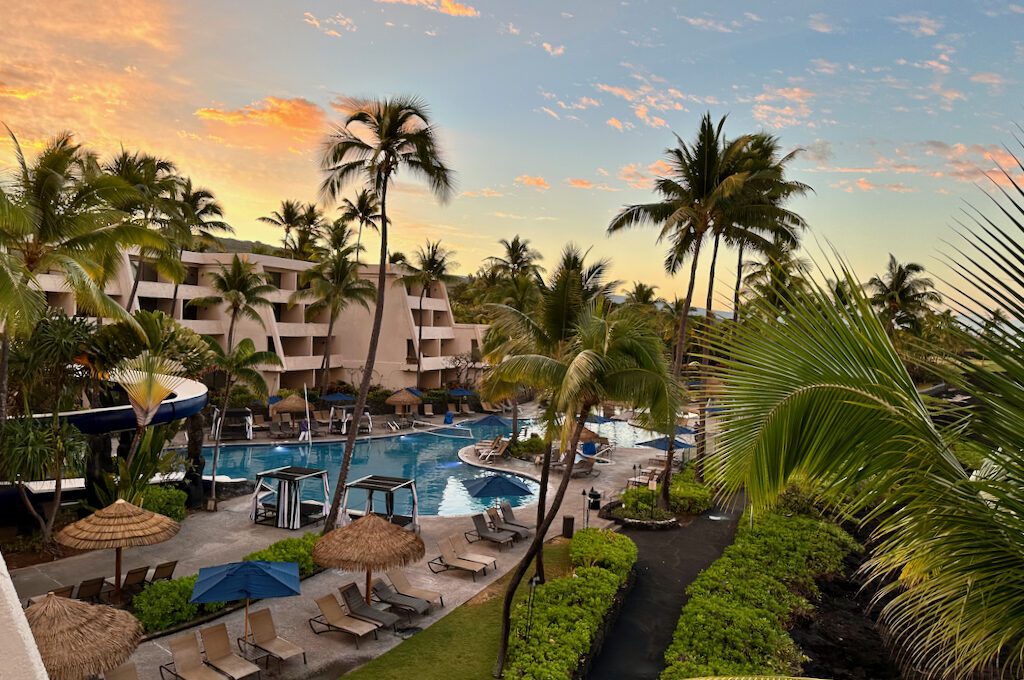
Travel: All about exploration and growth
Let’s face it: traveling is not the same thing as vacationing.
For sake of this discussion, we can just put aside the transportation aspect of travel. There’s a lot to be said about the love (and hate) people have for planes, trains, and automobiles and how that factors into everything mentioned here.
But when I’m talking about travel here it’s more about about exploring .
Getting introduced to new cultures, meeting new people, and experiencing new things is the name of the wanderlust game.
Unlike vacation where you are temporarily removing stressors from your life, think of travel as adding enrichment to your life for the long-haul.
When traveling, you typically go deeper into a location which means that you’ll probably be met with more challenges and opportunities to grow.
Instead of trying to avoid discomfort like you might on a vacation, you simply embrace it.
And yeah, that means you might get lost or scammed or come down with a case of some mysterious flu. But it also means you’ll have more unique and meaningful experiences, ones that will stay with you long after your sunburn fades.
You’ll learn how to step further out of your comfort zone and see things that only a small percent of the population has seen.
To me, traveling is much more rewarding and edifying than a typical vacation.
Traveling can also be very romantic, though in a different way from your typical “vacation romance.” You won’t be ordering up fancy hotel packages or filling hot tubs with rose petals.
Instead, your most romantic moments will come from the unexpected: stumbling upon a hidden waterfall, watching the northern lights dance above a frozen lake, or waiting for the sunrise from a mountaintop. It feels less staged and more original.
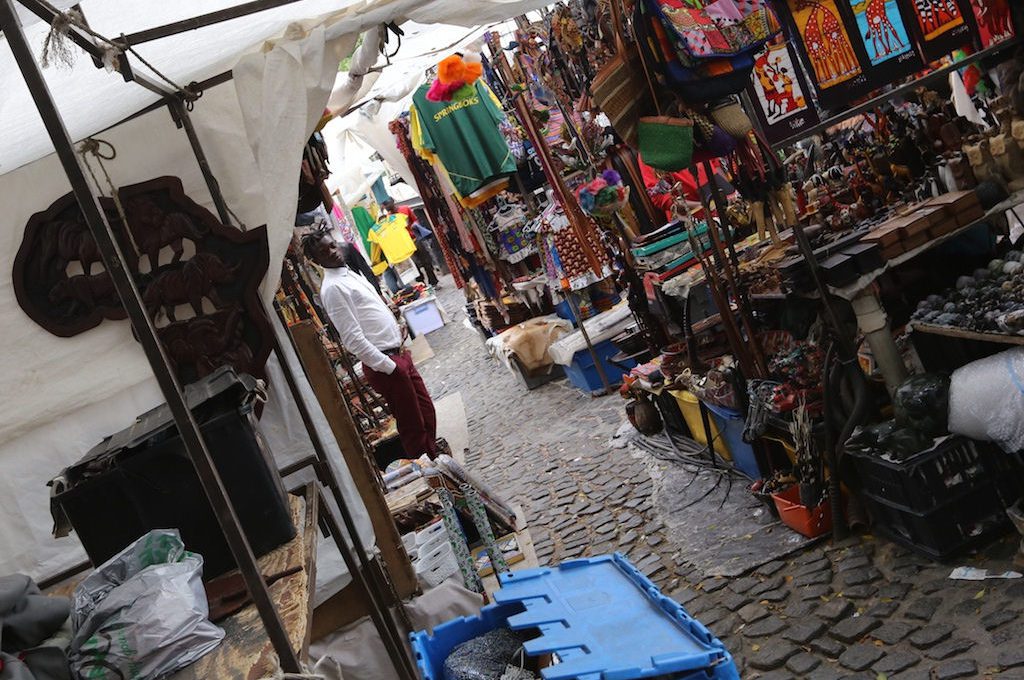
Meeting in the middle
Of course, lots of travel falls somewhere in the middle where you can enjoy a healthy mix of vacationing and traveling.
This would be a trip where you spend a good amount of time relaxing at a resort but also making efforts to get out and explore the locale.
I know all-inclusive resorts may seem like a great deal, but you don’t want to get stuck in a resort bubble. It’s like being in a hamster ball, except with unlimited piña coladas. Not always the best idea.
At the same time, some all-inclusive resorts, especially those on the higher end, may offer some really memorable excursions that can help get you out into the locale.
On Easter Island, we did an excursion at an all-inclusive resort that took us on a hike along the coast and through some ancient lava tubes with stunning views of the ocean. Our guide gave us fascinating insight into the history of the island and the entire experience left us enlightened and energized.
When we finished up, we took advantage of a blissful massage at the resort and that really gave us a good balance of vacationing and traveling.
Here are some tips for putting together an experience that caters to your vacation needs but also gives you more of a true travel experience.
Plan your relaxing vacation time towards the end of the trip
Once you get into the habit of relaxing on vacay, it’s much harder to pull yourself out of that mindset.
Leverage all the excitement and adrenaline you have at the beginning of a trip to fuel you to get out and interact with your destination.
So get out and explore first, then indulge in the resort’s comforts later. You’ll feel like you’ve earned it.
Focus on bang-for-buck cultural experiences
Because you’ll be spending a fair amount of time relaxing at a hotel or resort, you really want your limited time spent in your destination to be optimized.
Look for things like: highly rated food tours, cultural tours, historical tours, cooking lessons, etc.
These can be a lot of fun and get your taste buds tingling and your brain cells dancing.
If you want to venture out to historical landmarks on your own that’s cool too but just try to avoid the “checkbox mentality” so that your primary take-a-way isn’t just a photo album full of selfies in front of landmarks.
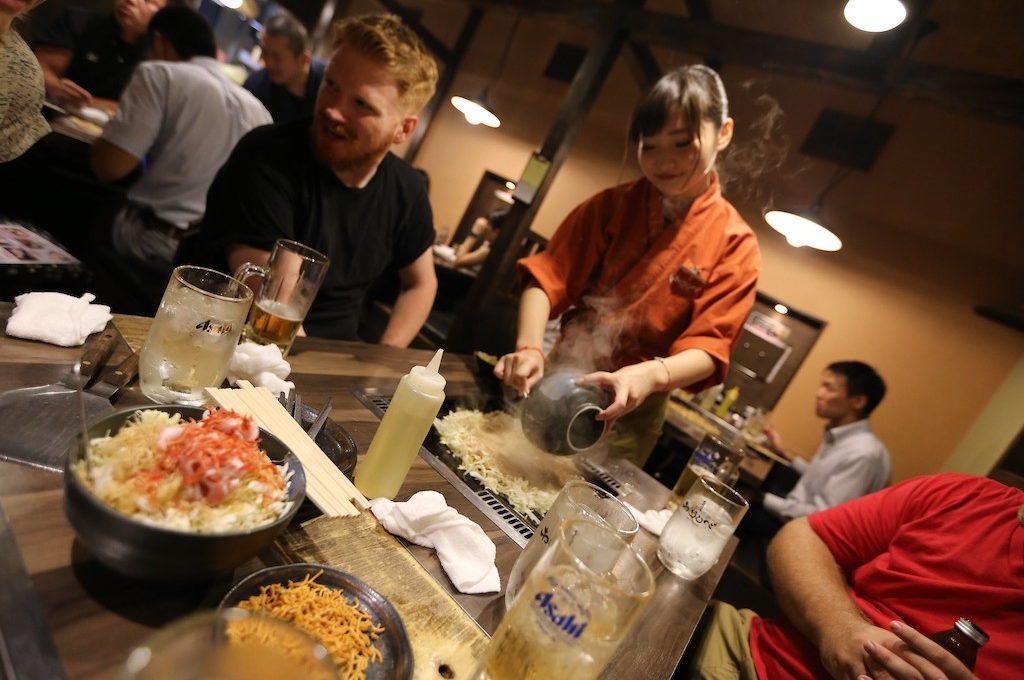
Try to time your visit with a special event
Some locations are known for their unique, bucket-list experiences.
Cage diving with the great white in South Africa , manta ray diving on the Big Island , fall color change in the Northeast, the list could go on and on.
If you can plan your trip so that you are able to experience some sort of unique bucket list experience, you’ll feel like your time was very well spent.
It’s one thing to take a stroll along a bubbling creek in Alaska and quite another to encounter a wild salmon run with bears on the prowl. One experience is far more memorable and less likely to make you regret just lounging by the pool (or fireplace) with a book later on.

Plan at least one solid museum outing
Museums are a solid way to take in a new place and learn about its history and culture.
But museums can be like a giant buffet, with an overwhelming amount of exhibits to devour. So don’t make the rookie mistake of trying to cram every museum into your itinerary like it’s some kind of museum marathon.
This can lead to rushing through corridors like a museum maniac and not being able to fully appreciate all of the exhibits. It can also be exhausting and unsatisfying.
Instead, savor each museum like you’re enjoying a fine dining experience. Take your time to appreciate the unique flavor of each exhibit and fully immerse yourself in the culture and history of the place. And who knows, you might even discover a new favorite dish….
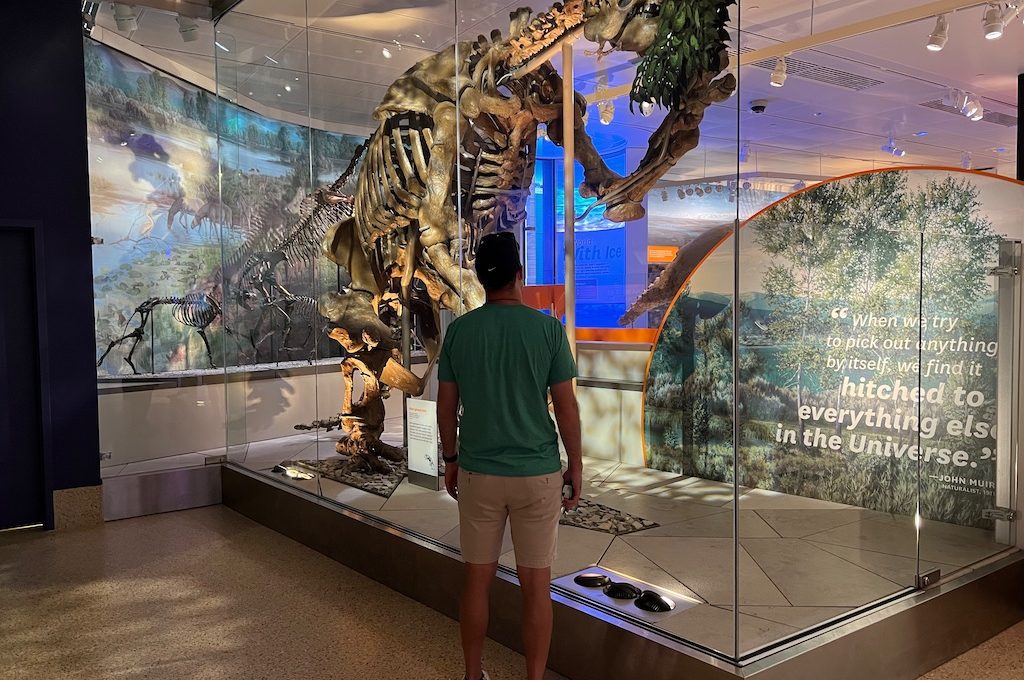
Spend some time in the outdoors
Try to plan at least one outing in the outdoors.
Smell the fresh forest aroma, breathe in the crisp mountain air, and enjoy the beauty of the scenery around you.
Whether it’s a hike through a national park, a stroll along a beach, or a visit to a botanical garden, spending time in nature is one of the best ways to appreciate a destination.
Sure, you might get chased by a swarm of bees or run into a bear but it’s all about the memories that last forever — just embrace it!
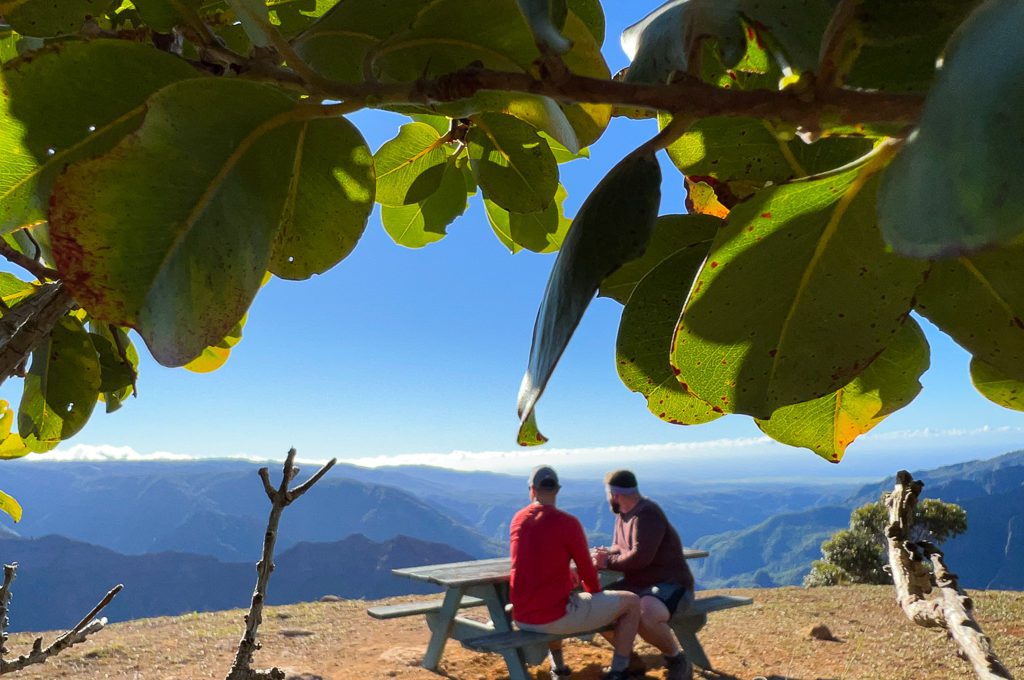
What’s the best: vacationing or traveling?
Personally, I’m going to prefer traveling over your standard vacation experience.
It’s largely because those experiences fit into the work side of travel blogging much better but also because I just find them more fulfilling. I get bored really fast sitting around a pool or being a beach bum.
But I do think there is a lot of value in taking vacations. Sometimes you just need that detachment from the daily routines in order to get back to the grind stronger. R&R is very necessary.
So I think what is best for you just comes down to timing.
If you feel like you need a break from it all or like your family needs to get on the same page then a vacation might fit the bill for you.
If you feel a yearning for something new and exciting in your life or feel like something is missing, focusing more on a travel experience could be what you need.
In the end, you’ll probably be going for a mix of these two things and in that case consider some of the tips above so that you can take advantage of the benefits of both!

Daniel Gillaspia is the Founder of UponArriving.com and the credit card app, WalletFlo . He is a former attorney turned travel expert covering destinations along with TSA, airline, and hotel policies. Since 2014, his content has been featured in publications such as National Geographic, Smithsonian Magazine, and CNBC. Read my bio .
Leave a Reply Cancel reply
Your email address will not be published. Required fields are marked *
Privacy Overview

What is the Difference Between Vacation and Travel?

Travel and vacation are both great things. But, there is a big difference between traveling and going on vacation.
Travel vs Vacation
According to Wikipedia , a vacation, or holiday, is a leave of absence from a regular occupation, or a specific trip, usually for the purpose of recreation or tourism.
Travel, to me, is more about discovering different cultures and expanding your horizon.
Traveling is harder work than going on a vacation .
People go on vacation mainly to relax and get away from it all. People travel to see and try new things and experience a different way of living.
And there is absolutely nothing wrong with going on vacation (I have been on some great vacations): staying in one place, relaxing and enjoying the comforts of a nice hotel. But, it is completely different from traveling.
When traveling you generally interact with locals more, you are more likely to use local transport and you get a glimpse of what life is like in the country you are visiting.
“ Real travel is not just about seeing new things, but also about seeing things with a new and refreshed perspective.”
This is an interesting article about travel vs vacation:
Your Wanderlust Is Inauthentic: The Real Difference Between Travel And Vacation Being a traveler does not mean expensive bikinis and concerts at an all-inclusive resort in the Caribbean . If there are umbrella drinks involved, you probably went on a vacation, not traveling. Travel is being integrated into a culture that values diverting from the beaten path, talking to locals and exploring an area as one of a kind. Traveling means attempting to blend in and wanting to leave as an altered and more educated person. Eat, drink and live like a local. Walk, cycle and take public transportation. If there is a language barrier, learn some words and try to start and finish conversations in the local language. Continue reading this article on Elitedaily.com >>
The Difference Between Travel and Vacation – Conclusion
I think the short answer to what the difference between vacation and travel is, is this:
A vacation is primarily about your own needs. Needing to relax, get away from it all, or recharge.
Traveling goes beyond that and looks at the places you visit. It’s more about exploring a new destination, getting to know the place and some of its people.
Trip vs Vacation
So what’s the difference between a trip and a vacation?
The words trip and vacation are often used interchangeably as they both take you away from your everyday life for a short period of time.
According to the Cambridge Dictionary a trip is a journey in which you go somewhere, usually for a short time, and come back again.
Again, a vacation is more about relaxation and getting away from it all. A vacation most likely takes you to just one destination where you get to enjoy time off.
This could be staying at a resort on a sunny beach, but also a mountain cabin or a nice bed & breakfast somewhere.
A trip is often more active. It could be a road trip, exploring several places by car. Or a city trip. Or even a day trip to visit a place closer to home.
- Why Travel? I Can Give You 10 Good Reasons!
- 10 Signs You Have Caught the Travel Bug
- 14 Incredible Bucket List Destinations for a Once in a Lifetime Trip
- How to Stay Safe While Traveling
Featured image: picture taken during my vacation on the Caribbean island of Bonaire , a perfect location for a scuba diving trip.
Leave a Comment Cancel reply
Contact: [email protected]
Created by Mar y San Design

The Cubicle Explorer
Discover the world beyond your cubicle. Practical tips & inspiration for 9-5 travelers. Join us on unforgettable adventures!

Travel vs Vacation: Is there a difference?
Are you someone who loves to jet off to new destinations frequently? Do you find yourself torn between the idea of “traveling” and “vacationing”? While these terms might seem interchangeable at first glance, there are subtle yet significant differences between the two that can greatly impact your experiences. Let’s delve into the nuances and uncover what sets them apart.
Defining Travel and Vacation

First things first, let’s establish clear definitions. “Travel” typically entails a journey embarked upon with the intention of exploration, cultural immersion, and personal growth. It often involves venturing beyond familiar surroundings, embracing new cultures, and seeking out unique experiences. Experiencing new places and seeing new things you’ve never seen before.
On the other hand, a “vacation” typically refers to a period of time spent away from one’s regular duties or work commitments, primarily for rest, relaxation, and recreation. It’s a chance to unwind, recharge, and indulge in leisure activities without the constraints of daily life. Vacation a lot of times is going to a place that you’ve already been to before, for a lot of people in the United States, that is Florida or somewhere warm with a lot of beaches where they can relax and soak in the sun while sipping on their cocktails. Or perhaps a cruise where they don’t have to worry about food or lodging and can just sail around and have fun! while doing it!

The travel person is more likely to wake up at 5am to go hike a mountain so they can see an incredible sunrise. The vacation person is more likely to sleep in until 10am and grab complimentary breakfast at their hotel while drinking mimosas or Bloody Mary’s. And there is nothing wrong with either person if that is their personal preference!
The Purpose of Your Journey
One of the key distinctions between travel and vacation lies in the purpose behind your journey. When you travel, the emphasis is on discovery and enrichment. You might immerse yourself in local customs, sample exotic cuisines, or engage in meaningful interactions with locals. It’s about broadening your horizons and gaining new perspectives. As well as experiencing new things and seeing new places!
Conversely, a vacation is more focused on rest and rejuvenation. Whether you’re lounging on a pristine beach, unwinding at a luxury spa, or simply enjoying downtime with loved ones, the primary goal is relaxation and stress relief. It’s a time to disconnect from the hustle and bustle of everyday life and prioritize self-care.

The Pace of Your Experience
Another factor that sets travel apart from vacation is the pace of your experience. Travel often involves a more active and immersive itinerary, with packed schedules and a desire to see and do as much as possible. You might find yourself exploring bustling cities, trekking through rugged landscapes, or hopping from one landmark to the next. It’s also about putting yourself in new and unforeseen places and positions. Stepping out of your comfort zone to try new things and getting the most out of your destinations and wanting to see and do everything there is to.
On the other hand, vacations tend to be more leisurely and laid-back. There’s less pressure to tick off sightseeing lists or stick to rigid schedules. Instead, you can take your time, savor the moment, and indulge in activities that bring you joy and relaxation. Whether it’s lounging by the pool with a good book or enjoying a leisurely stroll along the beach, vacations are all about slowing down and enjoying the present and being as comfortable as possible
Do you travel or “Go on Vacation” with a 9-5 job?

As you’re well aware by now, this site is about people who love to travel, explore, go on vacation, see new things etc while maintaining the steady routine of a 9-5 job to be able to fund your travels, save for the future and provide for yourself and your family.
A common misconception is that when you’re taking time off from your job, people say “you’re not traveling, you’re going on vacation” and this was a big reason as to why I wanted to write this article. To squash this misconception that you can’t “travel” with your 9-5 job.
For a lot of the social media influencers and people who want to gate keep the world “traveling” they think unless you’re taking months off at a time and exploring new countries and living with the locals, that you’re not “traveling” and that you’re simply on vacation. I 100% disagree with this. You can absolutely “travel” while maintaining your 9-5 job and using only your company holidays and allotted PTO days.
As by definition from above, if you are using your time off to travel to a new place, somewhere you’ve never been before, to do something new and see places you’ve never seen, then that in my book is indeed “Traveling.” You don’t need to stay in a county for months at a time and immerse yourself in the culture for it to be considered “Traveling” If you are out for a week or so, in a new place, with a busy schedule, experiencing somewhere new and stepping out of your comfort zone even a little bit, that is enough to be considered travel.
That may be the biggest thing I disagree with in this debate. The duration of the trip. Most people think vacations are usually a week or less and it isn’t considered “travel” unless it’s several weeks to months in length. For the majority of us 9-5 workers, that is almost impossible, but we are able to make due with the time we are allowed off and the holidays we get off as well. If we wanted to vacation we would go to Florida or Myrtle Beach or California or somewhere warm with beaches and a nice resort. If we want to travel, we will go someplace new with a packed itinerary filled with tours, hiking, walking and exploration.
Don’t listen to the naysayers, that is what this page is for. To let us Cubicle Explorers know that you can absolutely still travel and achieve your travel dreams while still working your 9-5 job and only using company holidays and PTO to be able to get out and travel.
Finding the Right Balance

Ultimately, whether you prefer to travel or vacation depends on your personal preferences, goals, and lifestyle. Some may thrive on the excitement and spontaneity of travel, while others prefer the relaxation and comfort of a vacation. Finding the right balance between the two is key to ensuring a fulfilling and rewarding travel experience.
So, the next time you’re planning your next getaway, consider whether you’re seeking adventure and exploration or rest and relaxation. By understanding the differences between travel and vacation, you can tailor your experiences to suit your individual desires and make the most of every journey.
In conclusion, while travel and vacation may have distinct meanings and purposes, both offer valuable opportunities for growth, enjoyment, and enrichment. Whether you’re jetting off to far-flung destinations or simply unwinding at a cozy beach resort, embrace the experience wholeheartedly and cherish the memories created along the way.
- Beginner’s Guide
- Credit Cards
- CardMatch Increased Targeted Offers!
- Travel Rewards Cards
- Small Business Cards
- Hotel Cards
- Airline Cards
- Cash Back Cards
- Amazon Deals
- Amex Offers
- Bank Account Bonuses
- Gift Card & Spending Deals
- MtM Podcast (Travel/Points)
- MtM Vegas Podcast
- MtM Diamond Community
- The MtM Team

Get Started
Learn more about Credit Cards, Travel Programs, Deals, and more.
Travel vs. Vacation: What is the Difference?
Enjoy MtM's content? Shop Amazon and we earn a commission!
Find all of the latest deals.
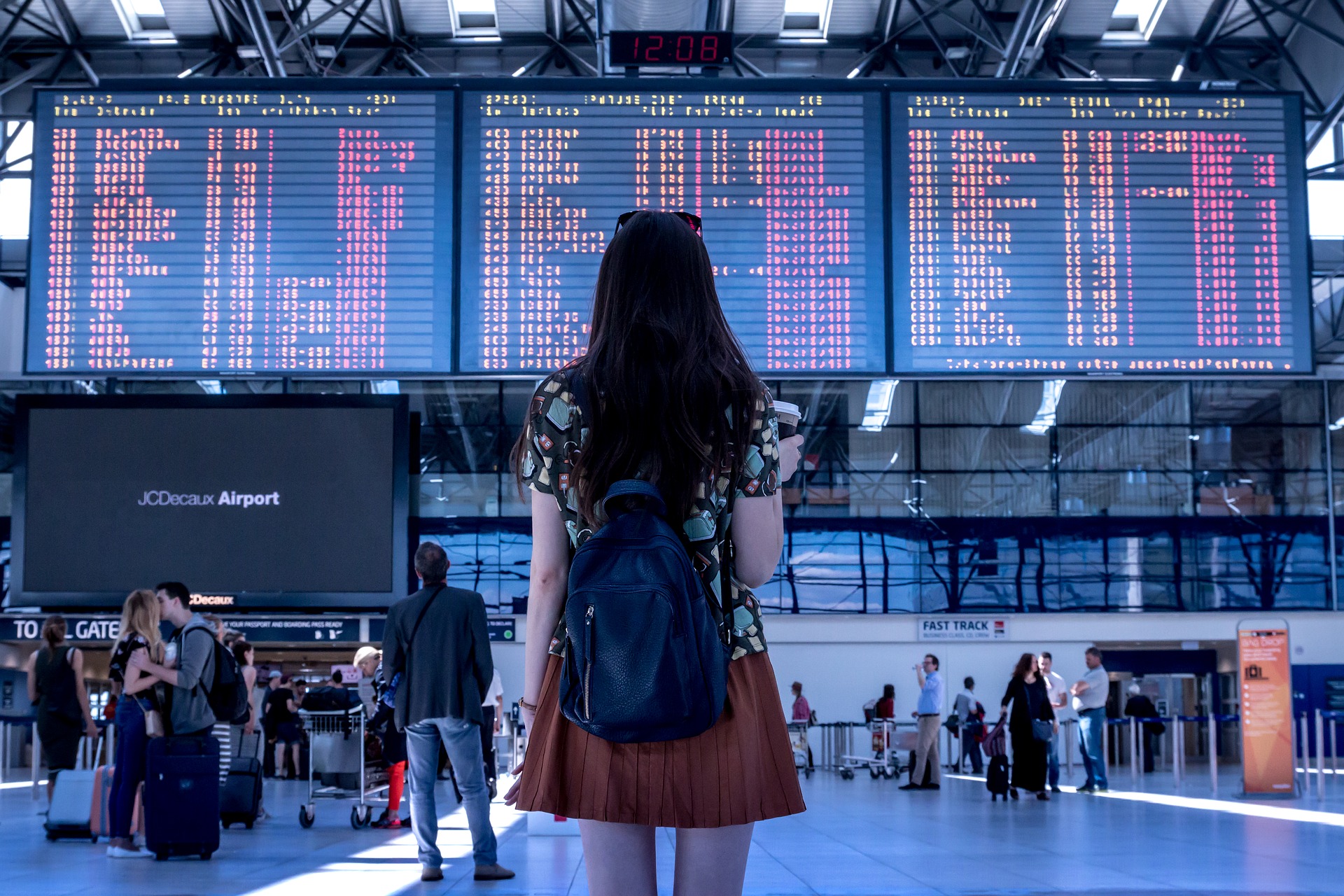
Travel vs. Vacation: Is There a Difference?
Vacation. Travel. People sometimes use these words interchangeably, but they aren’t actually one and the same. When I talk about travel vs. vacation, different things come to mind depending on which word is used. But that’s not to say that one is necessarily better than the other, although I do have my preference.
Consider the “travel” that consists of five nights at Disney World and a cruise through the Bahamas every year. This is all relaxation and fun. Or maybe just fun, as a trip to Disneyland with three kids hardly proved to be relaxing for my wife and I as new parents. In any case, this is vacation . Not travel. Not convinced? Let’s explore this debate of travel vs. vacation.
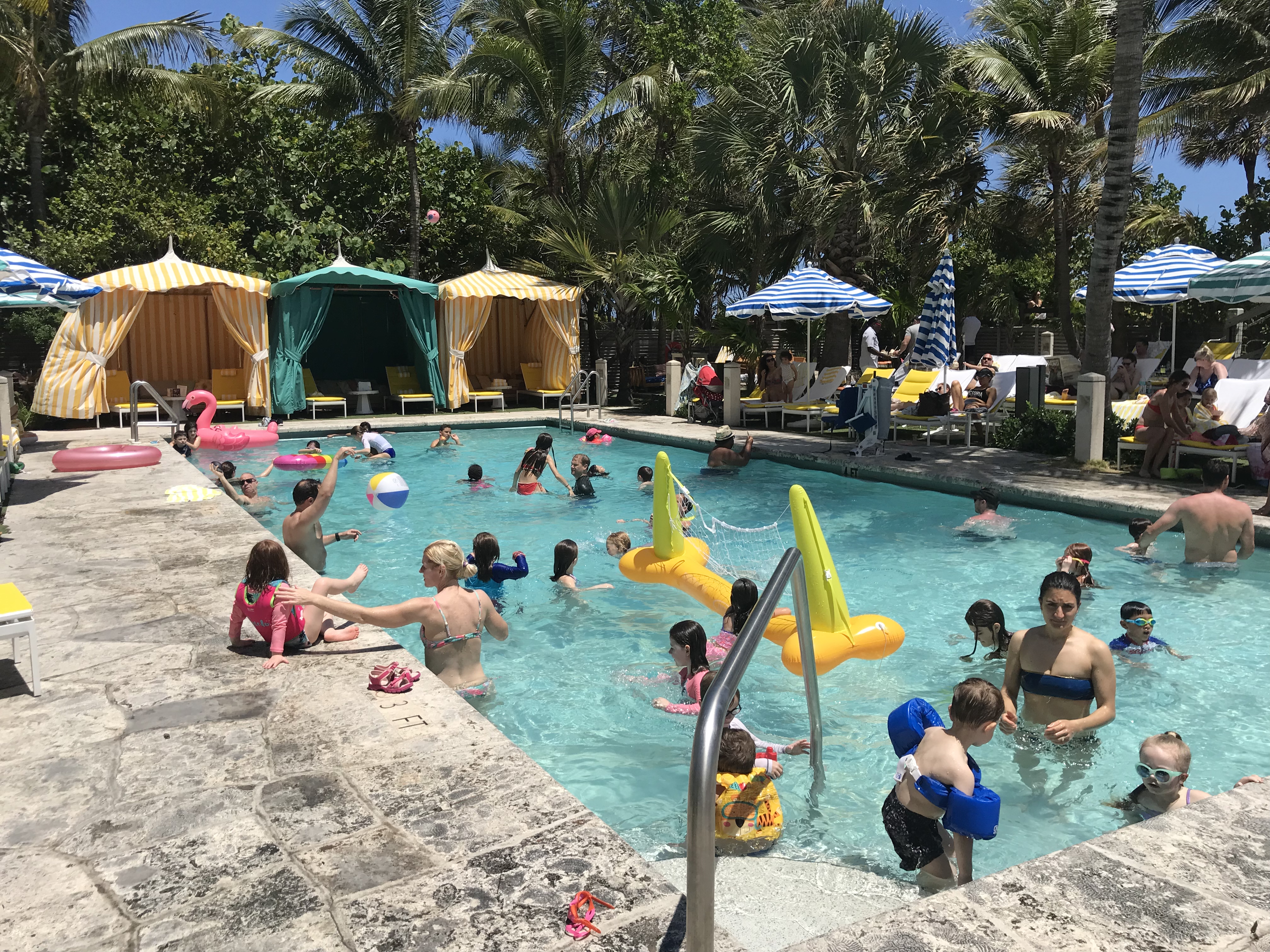
What Is Vacation?
If you’ll permit me the use of some very stereotypical scenarios, the epitome of vacation is jetting to Cancún and parking it for five days at a beach resort for five days during spring break (at least this is what a particular music professor thought all his students did every March). If you have kids, vacation is flying down to Disney World for a few days. The focus is on having fun, relaxing by a pool, eating good food, and getting away from the stresses of “regular” life.
Relaxation is the key ingredient of vacation. Weekend in Vegas? Vacation. A five day cruise to the Caribbean? Vacation. Maybe you’ll get to see a bit of each island during a couple shore excursions. But this is just a small taste of a place. You’ll be back on your ship and headed off for your next destination by evening.
I’m not saying it is bad to get away from the office for a week to refresh, relax and de-stress. This is totally fine. Some trips are vacation, but not truly travel. This is the distinction I’m trying to make. Now let’s delve into what defines travel.
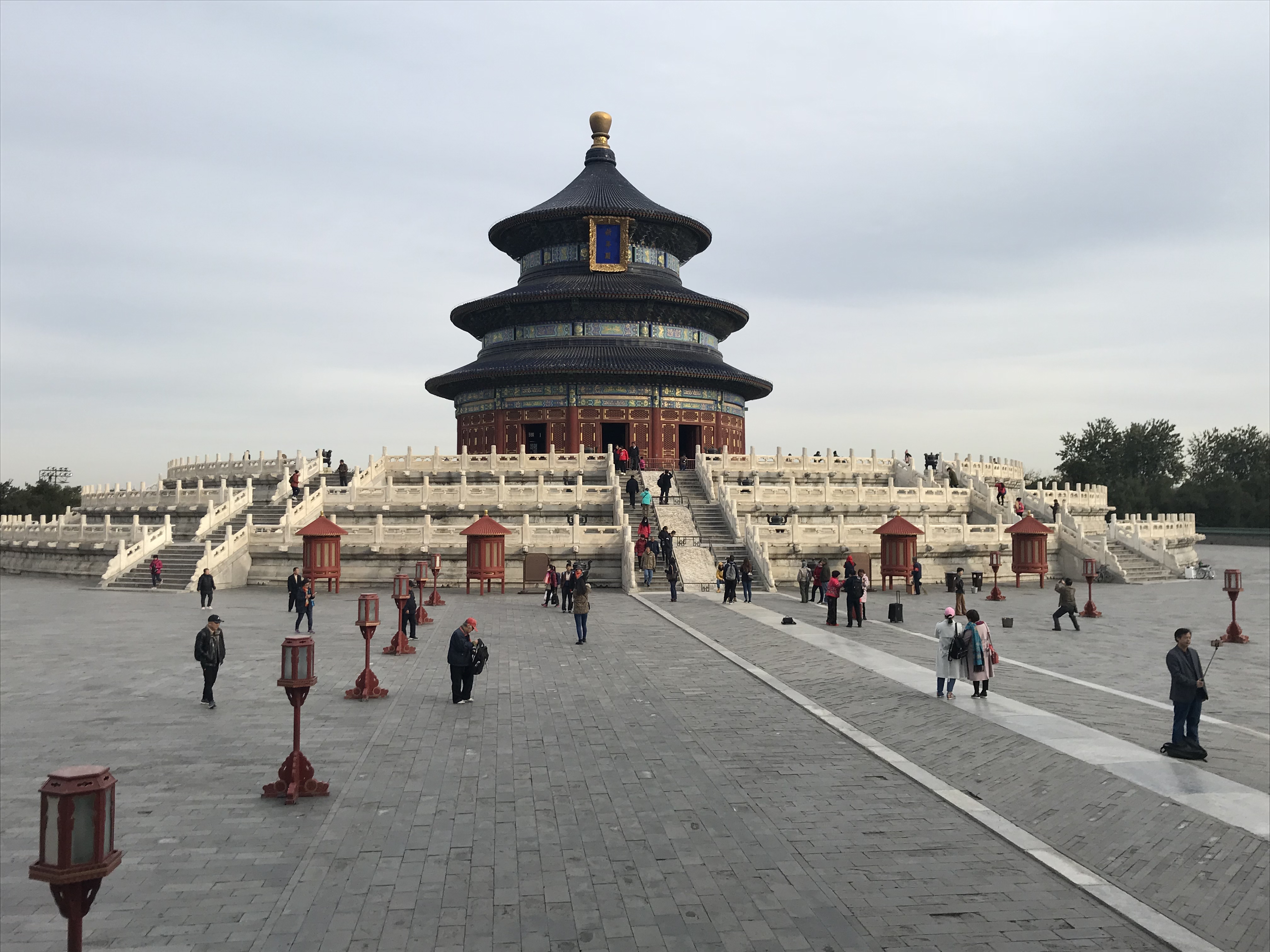
What Is Travel?
While you may travel for vacation, at least in the sense that you fly, drive, bus, and/or spend time on a cruise vessel. But there’s another word for that sort of travel that is not travel. You can call it transit . It’s the other definition that I want to explore.
Travel, in its purest sense, is crossing the globe to experience the new places. It may be for natural beauty, but more often it is to discover a new culture for yourself. It means learning new languages, immersing yourself in history, and trying new foods.
Travel should also provide growth. It is a challenge. There is effort required when it comes to exploring new places. Travel is an adventure that stretches you. You end up growing new skills, such as figuring out a mass transit system on the fly, or how to ask where the nearest bus stop is without knowing the language. The experience may be hard, but it is entirely worth it.
Travel opens your eyes to the world in a way that vacation simply cannot. Vacation means finding enjoyment in fun activities (or lack of activity). Travel means opening up yourself to the world.
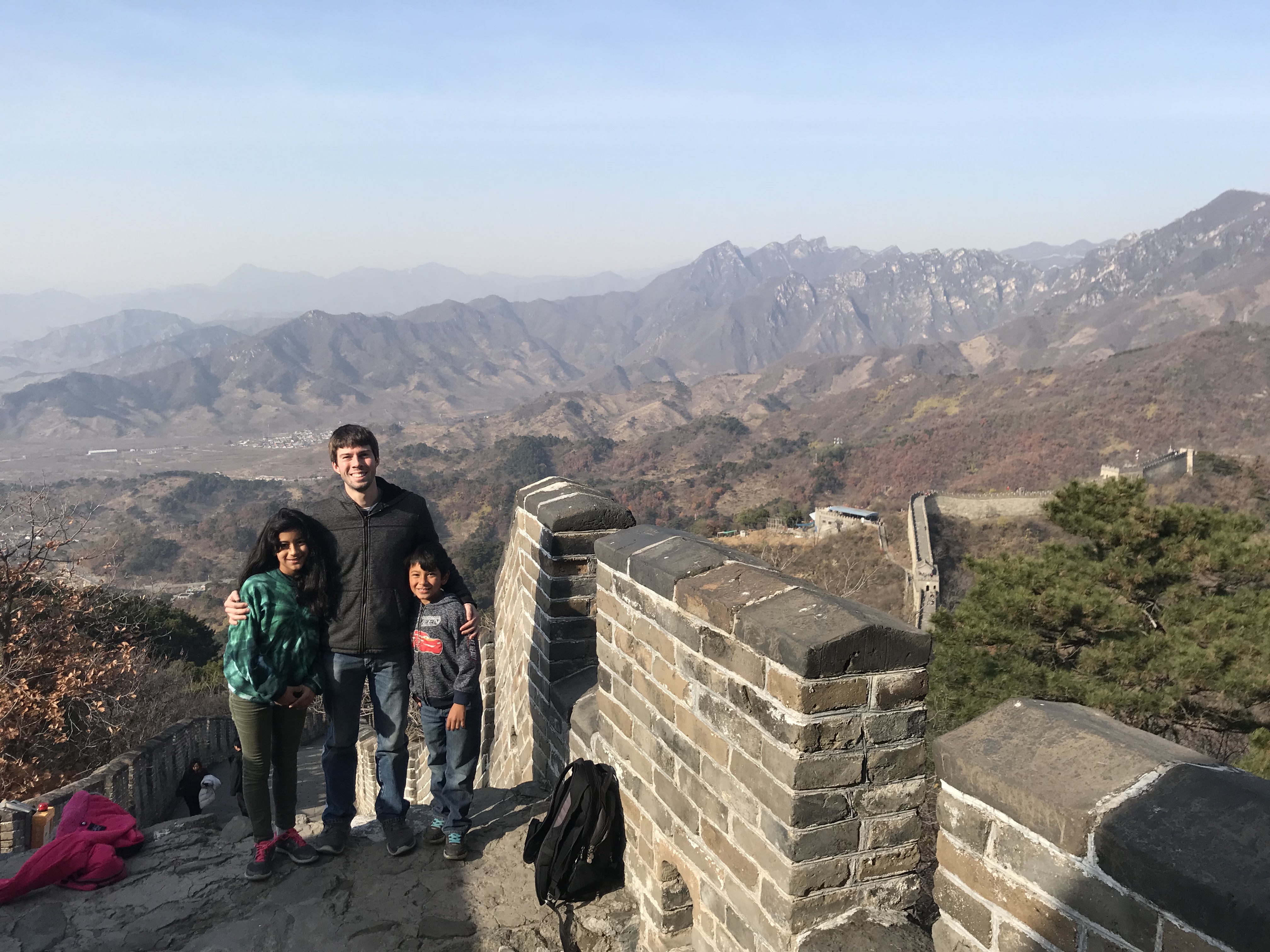
Blending The Two Is Possible
Many trips may blur the lines between vacation and travel, or they may have aspects of both at different times. I’ve done my best to incorporate elements of both travel and vacation into various trips. It doesn’t need to be one or the other, nor does there need to be a debate over whether a specific trip is travel vs. vacation.
My daughter and I enjoyed exploring South America this past April. The focus was on the history and culture (although we did end up in the hotel pool every night). However, we spent two nights in Miami Beach at the end of the trip, enjoying sunny Florida. Act I: primarily travel. Act II: totally vacation.
I don’t often really vacation. More than one day doing nothing, and I go stir crazy. This may sound odd, but spending time in airports and on airplanes is essentially a vacation. It’s enjoyable, and oddly relaxing, as long as my phone is not ringing off the hook and I can ignore the email for the day. Recently, I flew to Newark and back for fun .
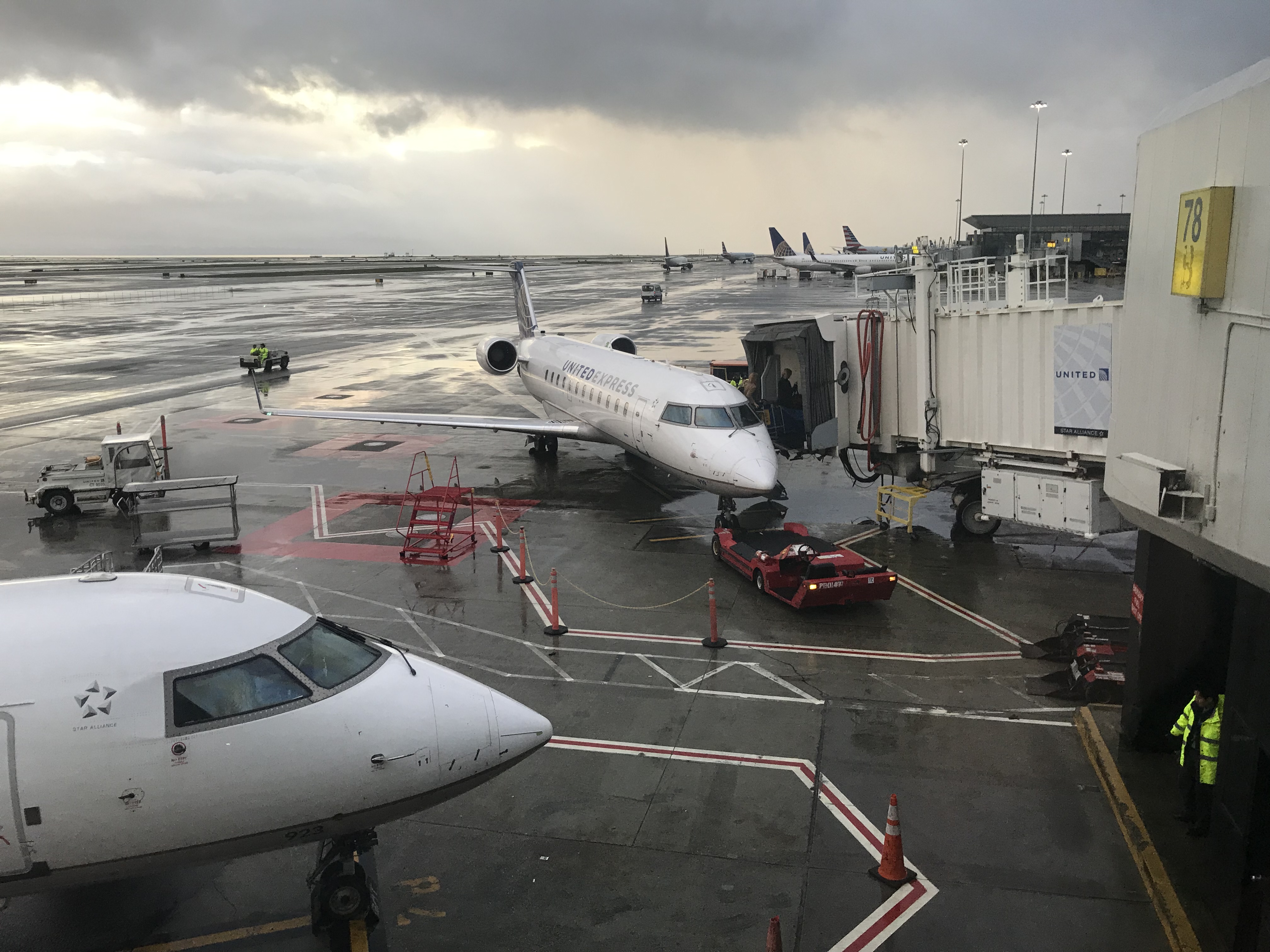
Travel vs. Vacation: Which One Is For You?
Ultimately, whatever sort of trip you prefer and plan should work for you. I’m not going to judge. I definitely prefer to travel and admittedly have an odd way of vacationing. But if parking it at a resort for a week is what you love (or *gasp* spending it at Disney World, the worst vacation ever ), go for it. Make it happen with miles and points!
Travel is what I want for my family. Part of the allure of visiting China is how completely foreign it is. Our kids are adopted from Costa Rica, so we are already an international family. But there is far more similarity among the five of us than between any of us and China. From getting laughed at when I butchered the little Chinese I’d practiced, to the mesmerizing exercise dance we observed in Beijing’s many parks, to wandering food stalls offering scorpions on a stick for a snack in Wangfujing, it was quite the experience.
Personally, I find travel to experience culture, history and natural beauty to be the most compelling and invigorating. I’m less interested in planning “fun” trips, where the end goal is simply fun (i.e. vacation). Yet the ideal, especially with kids, is planning a trip where there is a balance between the two. It doesn’t always need to be travel vs. vacation. There can be travel with some vacation. But I definitely still prefer the former over the latter.
Which do you prefer? Do you prefer to travel? Or do you prefer vacation? Or some blend of the two?
Lower Spend - Chase Ink Business Preferred ® 100K!

Learn more about this card and its features!
Responses are not provided or commissioned by the bank advertiser. Responses have not been reviewed, approved or otherwise endorsed by the bank advertiser. It is not the bank advertiser's responsibility to ensure all posts and/or questions are answered.
Not what I was expecting at all. I used to ask folks whether they were going on a trip or a vacation. A trip was really what many folks were taking. Driving to see family, sightseeing, anything with a schedule planned. I would never consider something as stressful as Disney a vacation! If a vacation is supposed to be relaxing, stress should be minimal. If you are feeling the constant urge to do something to get your money’s worth or for other reasons, is it relaxing? Now it is possible that the kids are having a vacation even if their caretakers are stressed!
Agreed! Disney was definitely *not* vacation for us as parents.
Travel with 1 day per 10 days Vacation.
If you’re considering that “transit”. I’m willing to spend more time than that in the air, if needed. But if you don’t make it overseas much, I can certainly agree. I used to routinely stretch any trip to the maximum possible.
I’d say that the difference is that vacation is for enjoyment while travel is due to necessity. Some people enjoy running around from dawn to dusk. Back in my travel agent days when I was around your age, I saw all kinds of vacation travelers. I noticed that city vacation types tended to be a bit more manic on seeing a lot, while country, beach, and cruise types were more inclined toward relaxation. To each their own.
It’s a balance. I go stir crazy if I’m still for more than a day or so, which means the cruising life doesn’t sound all that great. Except for Alaska, since you can constantly appreciate beautiful scenery.
LEAVE A REPLY Cancel reply
Save my name, email, and website in this browser for the next time I comment.
Citi and Chase Premium Cards Will Cover Higher Global Entry Fee
California bill aims to stop clear passengers from skipping tsa lines, i tried 4 of the most popular walt disney world character breakfasts – was it worth it for the cost, american express extends clear benefit for cardmembers.

At Miles to Memories we share the best tips, tricks and deals plus travel rants, musings, hotel, airline and loyalty program reviews and a lot more! Our goal is to help people save money so they can get out there and travel the world! Through our various blog posts , podcasts & videos we teach others how to maximize loyalty rewards, hotel & airline programs and credit cards to achieve amazing things.
- Terms Of Use
- Privacy Policy
- Advertiser Disclosure
Disclaimer - Miles to Memories & the author are not credit providers and do not provide personal financial or professional advice or credit assistance. The information published on this site/page is of a general nature only and does not consider your personal objectives, financial situation or particular needs. All information published here is personal opinion and comes from personal experience. The information published on this site/page should not be relied upon as a substitute for personal financial or professional advice. ESR Media, LLC, Miles to Memories and the author strongly recommend that you seek independent advice before you apply for any product or service, which is described on the site/page. Editorial Note - Opinions expressed here are the author's alone, not those of any partner bank, credit card issuer, hotel, airline, or other partner. This content has not been reviewed, approved or otherwise endorsed by any of the entities included within the post.
Travel vs Vacation: Exploring the Difference
- January 19, 2024
Are you planning your next getaway? Considering whether you should embark on a travel adventure or simply enjoy a relaxing vacation? While these terms may seem interchangeable, there is a distinct difference between travel and vacation. In this article, we will delve into the contrasting meanings, experiences, and benefits of both. So, grab your passport and let's explore the exciting world of travel and vacation!
What is Travel?
Travel is more than just visiting new destinations; it's an immersive experience that broadens your horizons. It involves stepping out of your comfort zone, embracing unfamiliar cultures, and engaging in unique activities. Unlike a typical vacation, travel is about exploration, discovery, and personal growth. It challenges you to adapt to new environments, try different cuisines, interact with locals, and learn about the history and traditions of the places you visit.
What is a Vacation?
On the other hand, a vacation is a period of time dedicated to relaxation, rejuvenation, and leisure. It is a break from the daily grind, allowing you to unwind and recharge. During a vacation, you can choose to stay in luxurious resorts, indulge in spa treatments, lounge by the beach, or simply laze around. It is an opportunity to escape the demands of everyday life and focus solely on rest and recreation.
The Key Differences
While both travel and vacation offer the chance to escape reality, their purposes and outcomes differ significantly. Here are the key distinctions between the two:
1. Mindset:
When you embark on a travel adventure, you adopt a curious and open mindset. You willingly embrace the challenges and uncertainties that come with exploring new territories. On the other hand, a vacation mindset is all about relaxation and indulgence. It prioritizes comfort and leisure, allowing you to unwind without venturing too far from your comfort zone.
2. Itinerary:
Travel often involves planning an extensive itinerary, filled with various activities, sightseeing, and cultural experiences. You may find yourself hiking through lush jungles, visiting ancient temples, or immersing yourself in local festivals. On the contrary, a vacation itinerary leans more towards relaxation and downtime. It revolves around lounging by the pool, enjoying spa treatments, and taking leisurely strolls along pristine beaches.
3. Duration:
Travel experiences tend to be longer in duration, spanning weeks or even months. This extended period allows for deeper immersion in different cultures and destinations. Vacations, on the other hand, are usually shorter in duration, lasting anywhere from a few days to a couple of weeks. They provide a brief respite from daily life, without delving too deeply into the cultural fabric of a place.
4. Experiences:
Travel offers diverse and transformative experiences. It introduces you to new perspectives, challenges your assumptions, and encourages personal growth. You may find yourself conquering fears, learning new languages, or engaging in volunteer work. On the contrary, vacations offer a more predictable set of experiences. They aim to provide relaxation, comfort, and luxury, allowing you to disconnect from the world and pamper yourself.
The Benefits of Travel
Now that we have explored the differences between travel and vacation, let's focus on the unique benefits that travel offers:
1. Cultural Immersion:
Traveling allows you to immerse yourself in the rich tapestry of different cultures. You can experience local traditions, taste authentic cuisines, and witness vibrant festivals. By engaging directly with locals, you gain a deeper understanding of their way of life and develop a broader perspective.
2. Personal Growth:
Stepping out of your comfort zone and navigating unfamiliar territories fosters personal growth. Travel challenges you to adapt to new environments, push your boundaries, and develop problem-solving skills. It increases your self-confidence and resilience, making you more adaptable and open-minded.
3. Broadened Horizons:
Exploring new destinations exposes you to different perspectives and ways of thinking. It broadens your horizons and challenges preconceived notions. By embracing diversity, you become more empathetic, tolerant, and understanding.
4. Unforgettable Memories:
Travel adventures often lead to unforgettable memories. Whether it's watching a breathtaking sunset, climbing a majestic mountain, or encountering rare wildlife, these moments stay etched in your heart forever. The stories and experiences you gather while traveling become a part of who you are.
The Benefits of Vacation
On the other hand, vacations offer a unique set of benefits that cater to rest and relaxation:
1. Stress Relief:
Vacations provide a much-needed break from the stresses of everyday life. They allow you to recharge your batteries, rejuvenate your mind and body, and reduce stress levels. Spending time in tranquil environments and engaging in leisure activities promotes overall well-being.
2. Quality Time:
Vacations offer an opportunity to spend quality time with loved ones. Whether it's a romantic getaway or a family vacation, these moments create lasting bonds and cherished memories. Sharing laughter, adventures, and relaxation strengthens relationships and creates a sense of togetherness.
3. Self-Care:
Taking a vacation is an act of self-care. It prioritizes your well-being and allows you to focus on yourself without any distractions. Whether you indulge in spa treatments, practice mindfulness, or simply relax by the beach, vacations provide a space for self-reflection and rejuvenation.
4. Recharge and Reenergize:
Vacations give you the chance to disconnect from work and daily responsibilities. By taking a step back, you can recharge your energy levels and return to your routine with renewed vigor. This break from the mundane allows you to return to your everyday life feeling refreshed and motivated.
So, Should You Travel or Vacation?
Now that we have explored the differences and benefits of travel and vacation, the question remains: should you travel or take a vacation? The answer depends on your personal preferences, goals, and desires. If you seek adventure, personal growth, and cultural exploration, then travel is the way to go. On the other hand, if you prioritize relaxation, rejuvenation, and quality time with loved ones, a vacation may be more suitable.
Ultimately, both travel and vacation offer unique experiences and benefits. They cater to different needs and desires, allowing you to fulfill your wanderlust or simply unwind. The choice is yours, and it may even vary depending on your mood or circumstances. So, go ahead, plan your next adventure or book that dreamy beachside getaway, and create memories that will last a lifetime!
Remember, life is a journey, and whether you choose to travel or take a vacation, the most important thing is to embrace the experience, cherish the moments, and keep exploring the beautiful world we live in!
References:
- Travel – Wikipedia
- Vacation – Wikipedia
Leave a Reply Cancel reply
Your email address will not be published. Required fields are marked *
Save my name, email, and website in this browser for the next time I comment.
D'Orsay vs Louvre: Paris Museum Comparison
Time traveling through longitudes, you may also like.
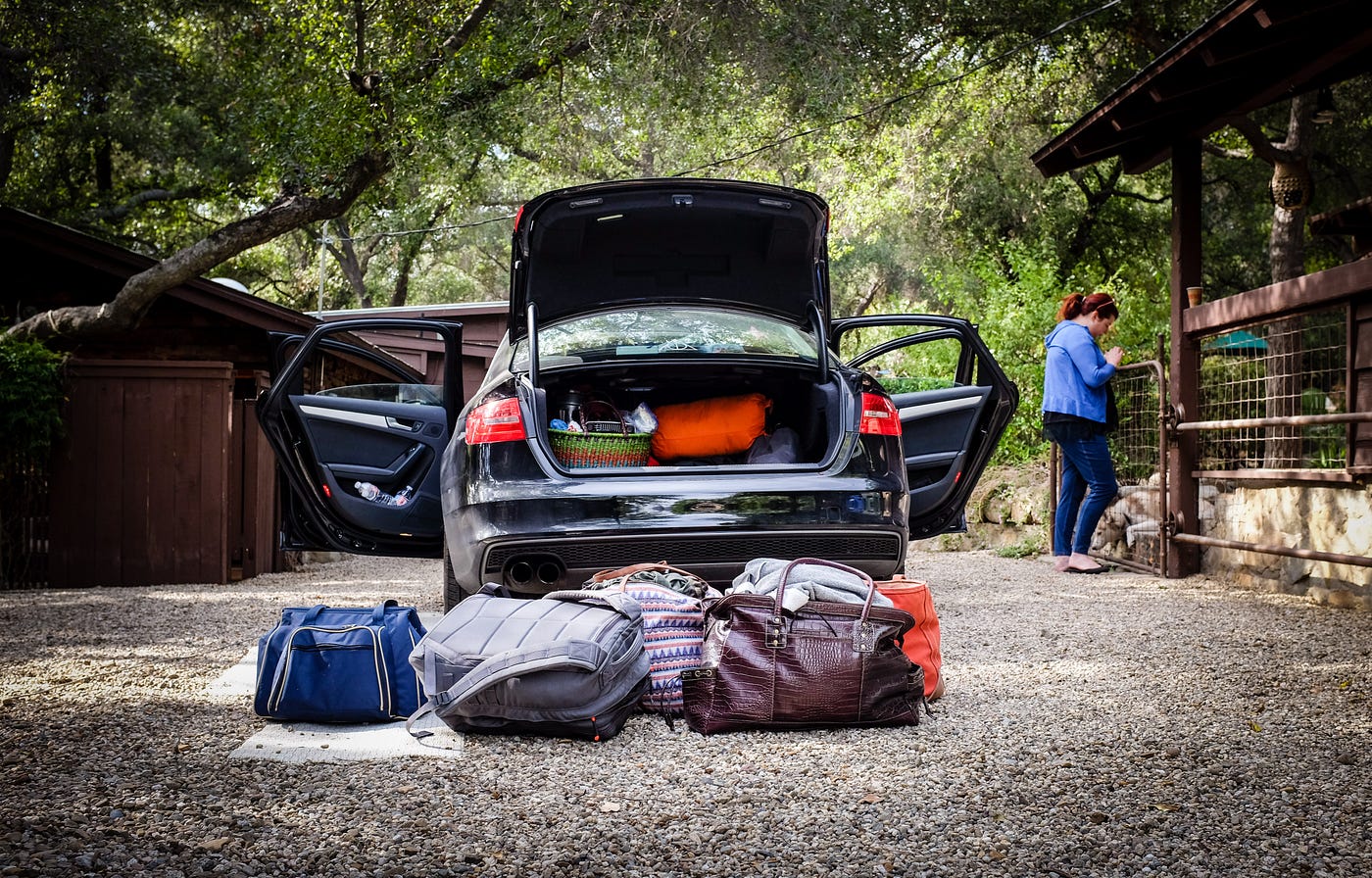
Family Packing Tips: Organizing for Every Member
- February 14, 2024
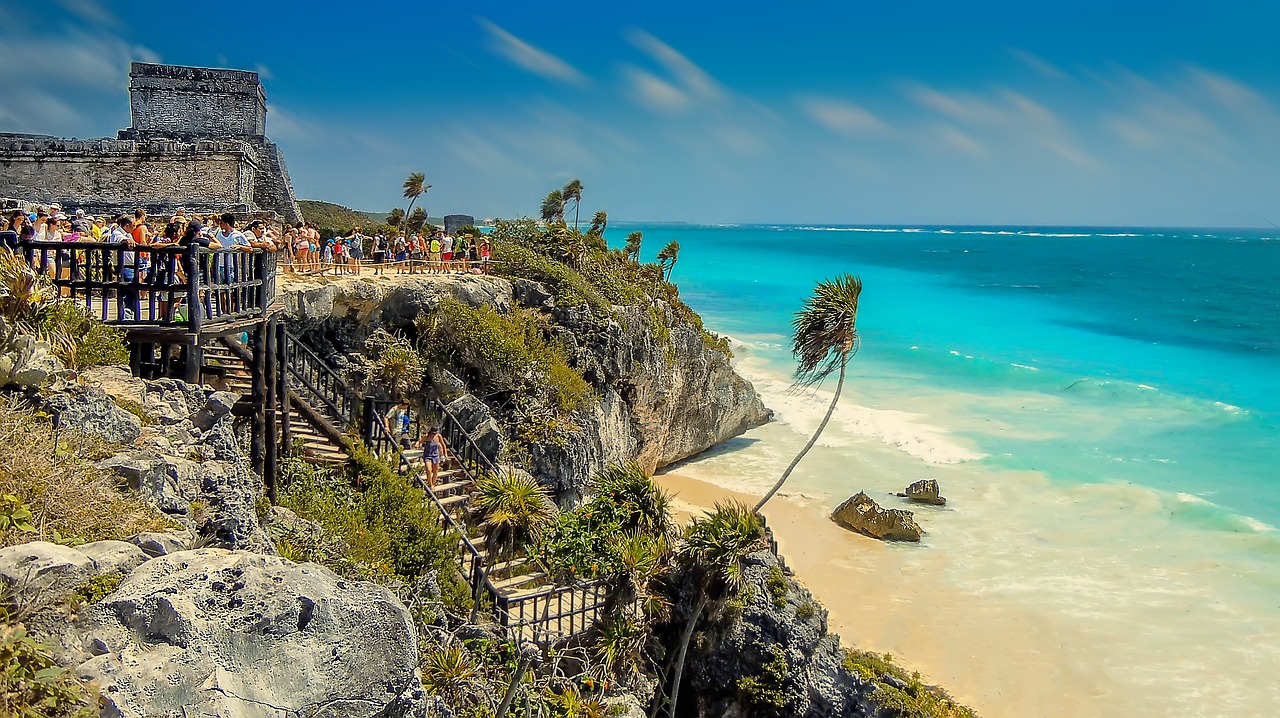
Cancun vs Playa del Carmen vs Tulum: Best Riviera Maya Destination
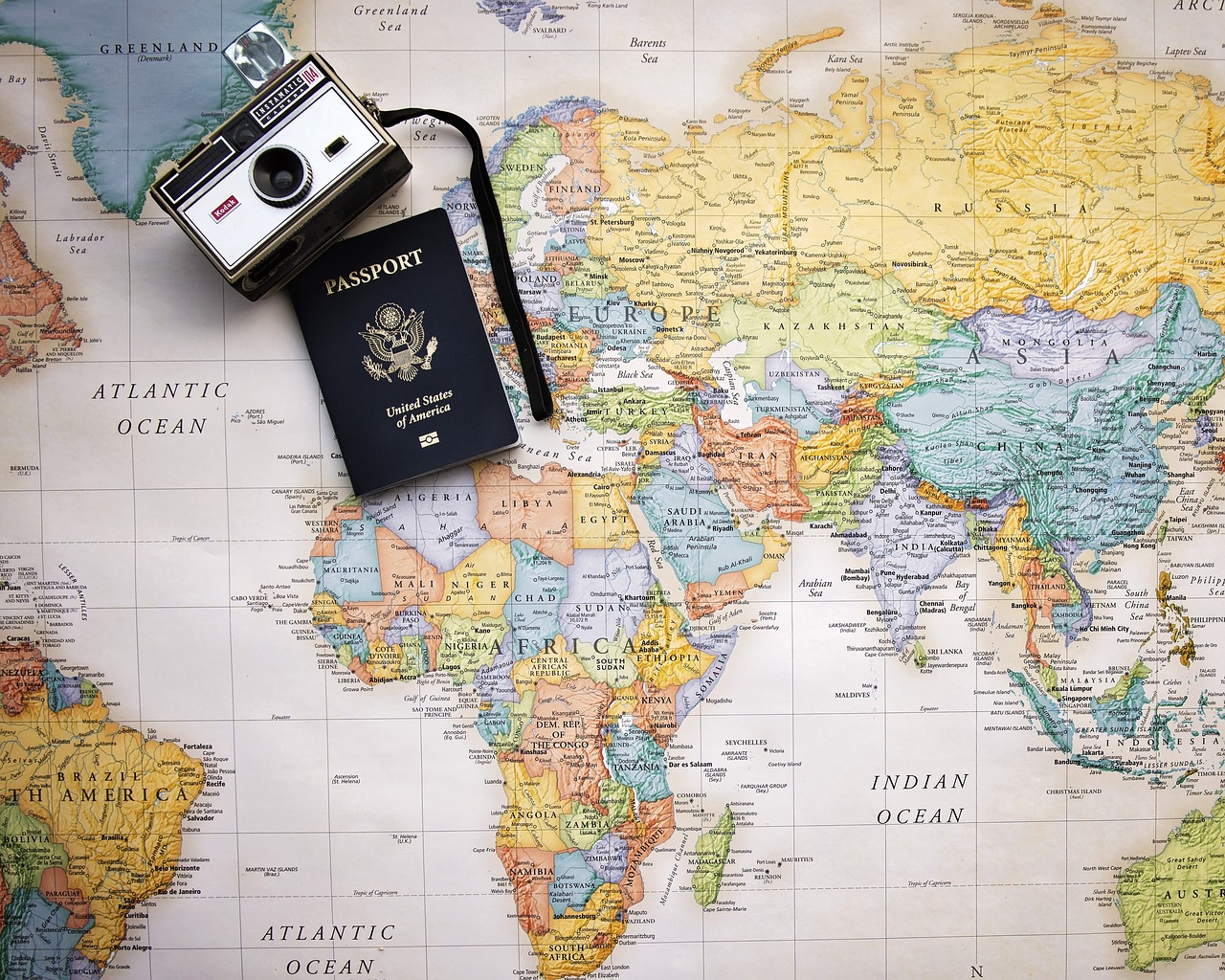
36 Pages vs. 60 Pages in Passport: Understanding Passport Types

JetBlue vs United: Airline Service Comparison
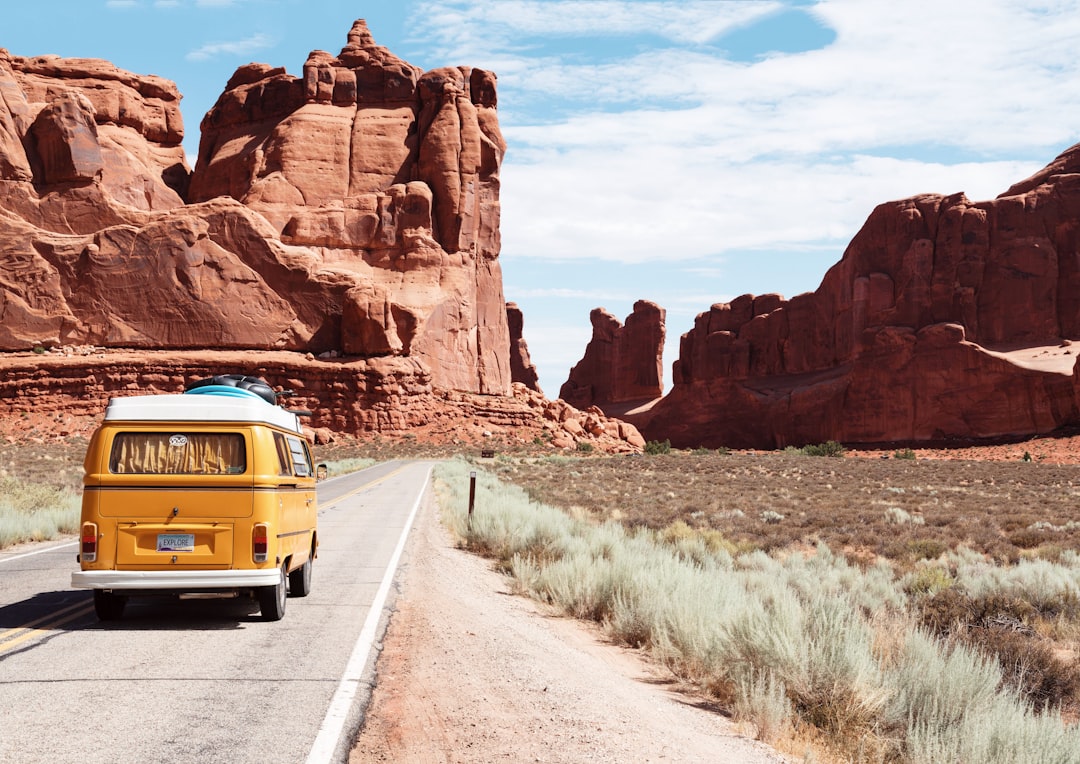
Historical Travel: Time-Traveling to the Past
- February 13, 2024
Swiss Half Fare Card vs Swiss Pass: Travel Cards
Travel vs Vacation
The Differences Between Travel and a Vacation
What is the main difference between travel and vacation.
Travel and vacations are different things but they do have one thing in common; they refresh you. Vacations are a getaway for a week or two or even a month to recharge your batteries. A place to rest and relax from your daily work and life stresses. It is easy. You hop on a plane, ship or train. You check-in to a place that looks after you. You spend your time there and maybe take in some tourist activities. Then you get back on the plane, ship or train and go home. All rested and recharged and ready to face your daily life once again until the next vacation.
Travel is more. Travel is wanting to learn about another culture. Living within that culture. Eating their food. Drinking their beverages. Learning their language – even if it just some simple shop keeper phrases. Understanding their history. Learning their stories. Appreciating their art, music, theatre, literature, and architecture. Understanding the way the people in that culture think and go about their daily lives. What is important to them. Making a connection with them in some way.
Travel is a deeper meaningful experience than a vacation. It develops memories that last a lifetime. It allows you to understand how other people think and do things. You realize that there are so many cultures in the world and they are all wonderful and vibrant and fun, if you understand them. You realize that people around the world are friendly and kind to strangers.
Planning Trips
For me, one of the great pleasures of travel is planning the trip. Over a period of months reading and thinking about the places we want to go, see and experience. With the great amount of written and digital resources available today it is easy to spend months researching and reading. It is a chance to live in your mind all those places that you always wanted to go to. It gives you a head start for enjoying your time there. You hit the ground running so to speak because you have a familiarity with the region before you get there.
The logistics of trip planning vs vacation planning is overwhelming for some. There is so much detail that goes into trip planning. I have friends that let a travel agent plan out their trips because there are too many steps for them. But, they end up paying double or more than what I pay for the same trip. The planning is easy if you take your time and give yourself time.
We usually decide our travel destination two years out. I start to do some general research on flights and accommodations and then start reading more extensively about the area. Tourism information from government agencies, tourist organizations, and travel blogs are all good sources of information. All of these will send me on different tangents to uncover some pretty obscure information that all adds to my understanding of the place. I make notes and get a general feel for the place.
Finding Cheap Flights
A year out I will start to look for the lowest flight prices on different dates. I already have in mind what a fair price will be, what a great price will be, and what is the cheapest price I can get a flight. We have flown to lots of places for under a hundred dollars. We have flown to places for free. After awhile you get a sense of what you can pay if you are flexible. As soon as I see that price range I grab it and book our flights.
The same applies for car rentals if you are going to need a car. The great thing with car rentals is that you can change your reservation at any time without penalty. I keep a watch on prices from time-to-time. If I see a better price, I book at that price and then cancel my previous reservation. I have saved thousands of dollars over the years with this little tip.
The difference in trip lengths between travel and a vacation
Another difference between travel and vacation is the length of the trip. Vacations are generally 1-4 weeks in length with most being 2 weeks or less. Our trips are generally 8-10 weeks. We like to spend a week or two in each place. I could easily spend a couple of months in each place we go to visit. That would be my preference because I love to read and write and just absorb the complete atmosphere of the place while I am doing what I love to do. But, when you travel with a partner there are compromises. My wife, Loie, is only good for a week or two in a place while we are traveling.
We have done a few 3 months-in-one-place trips but it is usually too long for Loie as there is not enough for her to do on a day-to-day basis. Each traveller is different and you have to take that into account when you are planning. Everyone wants to have fun and enjoy their time on the trip. That means different things to each person and all of that has to be taken into account when planning the trip.
Being what it is for us, I plan our trips so that we are in new places for a week, although we have extended that time if we really like the place. In Hoi An, Vietnam, we extended our stay by a week because we really fell in love with the place and the people. And when we did move on, we only went 40 minutes north to Da Nang where we spent a wonderful week.
How Does Slow Travel Reduce Travel Stress?
Travel allows you to create a routine for yourself. On a European vacation where you visit a number of spots in a short period of time, you are on the move all the time with little time to experience the area. A few days here then you are on a plane, train, bus or driving to some other unknown place where you don’t know where anything is located. Another new accommodation with another unfamiliar bed and surroundings. You get overwhelmed with all the new things to see and do. Everything at the end is just a blur of activity.
Spending a week or a month in a place allows you to develop a daily routine. Your daily walks, shopping, preparing meals. Recognizing shop keepers and people in the neighbourhood. That reduces the stress of being in unfamiliar surroundings. You feel more relaxed and are able to take in and absorb things instead of being constantly bombarded with new things that need your decisions and reactions that over time mentally and physically exhaust you.
Is Slow Travel Cheaper Than Vacations?
The cost is a major difference between travel and vacation. Vacations cost up to 10 times more per day than when you travel. If you were to fly to an all inclusive resort for your vacation you will spend a minimum of $2500 a person. Most people will end up spending more like $4000 for the week, if you are truthful and take in all the extra expenses like new clothes and other accessories. This works out to almost $600 per person per day!
In addition to the $600 per day, you have a complete set of other expenses that you are paying while you are away. Ongoing expenses like cable, Internet, phone, insurances, electricity, heating, and so on that continue even when you are not there. Vacations are expensive. They are a treat to yourself. And sometimes they are a necessity for your mental health. But it is not a sustainable way to travel unless you are rich.
Traveling is much cheaper. Way cheaper. Our last trip to Miami cost us $50 a day per person. Our last trip to Panama cost us $60 a day per person. That is all in. Airfare, accommodations, admission tickets, taxis, car rental, and all taxes for a month. We don’t count food in our travel budget as our food costs are about the same whether we are traveling or staying home.
This is how we can afford to take 3 major trips a year along with 2 or 3 minor trips. We have been doing that for the past 15 years and have learned the meaning of travel. Once you start, you can’t stop.
4 thoughts on “Travel vs Vacation”
Very interesting details you have noted, appreciate it for putting up.
Thank you. I am glad it gave you some interesting details.
I do believe all the ideas you’ve presented to your post. They’re really convincing and can definitely work. Still, the posts are too quick for starters. May you please prolong them a bit from next time? Thank you for the post.
Thank you. I will lengthen them. I am working on a complete workbook that will be free for subscribing.
Comments are closed.

They say to travel is to live your own story. All too often, a trip becomes a list - places, museums, mountain tops, famous villages, renowned restaurants. Check them off, share the photos. Move on.
But if you take a trip on your own terms, to a place that genuinely calls you, the results can be transformative.
Elena was just back from a hike in Denali . She'd spent the day traversing the trail-less tundra up to the Cloudberry lookout above Wonder Lake. It was early fall in Alaska , a quiet time of year when the natural world changes rapidly. Winter creeps in with every gust.
A US Marine from Central California, Elena was traveling in Alaska on her own. She'd booked three nights by herself at a lodge in the heart of Denali National Park, a long, long way from the hustle and bustle of her regular life. And that was precisely the point.
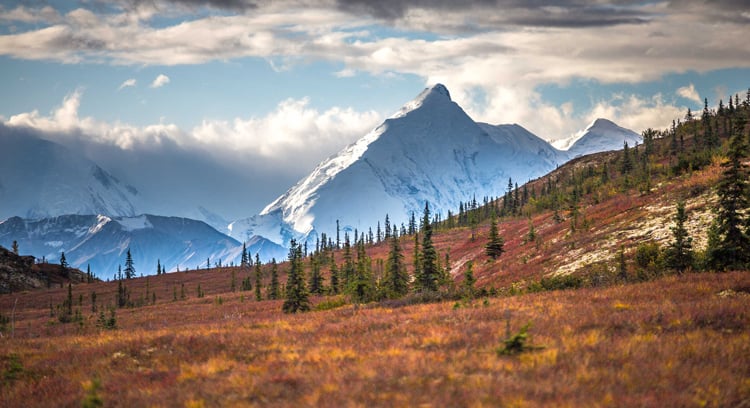
"I just needed some space, some big space," she says in a quiet voice. Unclear about any specific goals or aiming to check off any lists, Elena was embracing the simple joy of travel.
This trip into the heart of Alaska was, for Elena, about discovery. She was looking to learn about the world, and in the process, learn about herself. Wild places tend to offer that kind of thing up in droves. After all, it's not just about spotting wildlife (although that too can change your life). It's about the solace of solitude and reconnecting with what's important to you. Travel can quell a restless soul, soften a hardened heart and unlock the most rigid mind. Of course, time spent in amazing places isn't necessarily life-altering. But its the potential that matters.
"These landscapes make me feel whole. They put my life in perspective," Elena says. "I just want to soak it all in."
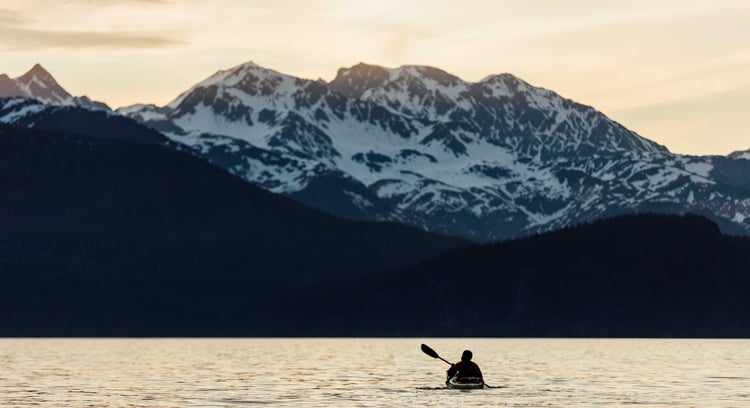
Travel is about more than just relaxing
Having some time to just relax is never a bad thing. A traditional vacation can mean settling in somewhere comfortable and staying put. It can bring rejuvenation, mend aches and pains and give you a break from the chores and monotony of daily life. That's vacationing - you want to return home relaxed.
Traveling, on the other hand, is about the journey. It's stepping outside your routine, embracing adventure. The goal is to return home a smarter, healthier and better person.

Here is how traveling is different from vacationing:
- Travel is about the place. While a vacation can be about your own needs (needing to relax, needing to recharge), traveling is looking beyond yourself to the place you are at. For Elena, that meant absorbing all she could about the berries of the tundra, the history of mountaineering in the Alaska Range and the feeling in her heart this vast, quiet place brought.
- To learn is to understand. Sometimes it's learning to speak a foreign language or mastering the art of making gnocchi. Other times, it's discovering the lifecycle of the gray whale or grasping glaciology. Whatever it is you take in, traveling broadens your understanding of the world.
- Pushing yourself = discovering yourself. Trying something new can be tough. Many of us fear new things. Take it one step at a time, though, and you'll see the outcomes. Go for a full-day hike. Kayak around an island. Try the local cuisine. From a new passion to a new career, the kinds of things you discover while traveling can only help you grow and make the most of your life.
- Be transformed. If you're a city dweller, the wilderness can astound you. If you live in a small village, a trip to a downtown gallery may blow your mind. Either way, travel asks you to examine your own life, your own culture and your own place in the world. In the process, there's no doubt you'll become something better.

Book Your Experience
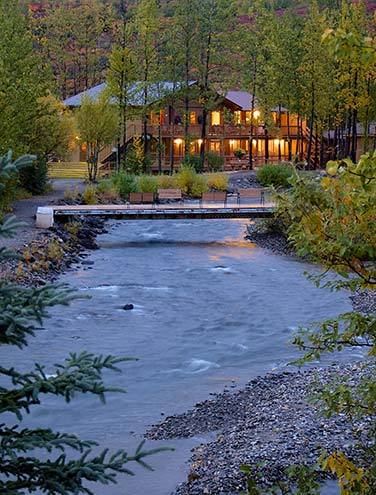
More Stories Like This

Traveling vs. Vacationing: What’s the Difference?
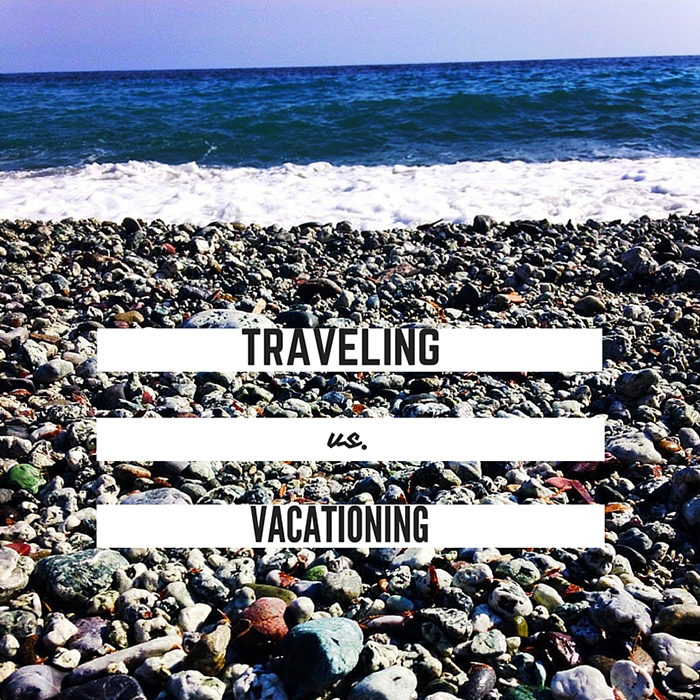
People ask me all the time why I love traveling so much. The reason is that I love exploring new places and learning about the cultures of the places I’m visiting. But, traveling is not a vacation. There is a HUGE difference between the two! In fact, sometimes I feel like I need a vacation after all of my travels!
So, what’s the difference?
Well, when I am traveling, I try to immerse myself in the culture as much as possible, even if I only have a few days in that destination. Whether its taking a tour, going to a museum, or indulging in the local cuisine, it gives me a chance to learn more about the place that I’m in.
When I’m vacationing, I usually park my butt on a lounge chair or in front of a fire with a good book and don’t move until my vacation is over. I like to indulge in a massage, some all you can eat buffets, anything easy.
Which is better?
Honestly, I love both of them. I prefer traveling in a lot of instances just because you get to see more of a place or the country that you are visiting. When I vacation, I’m usually at an all inclusive resort and don’t really even bother leaving — I used to do more of this when I was younger, on family trips. We would leave on organized excursions that always left me wanting to see more of where I was, but then I’d instantly forget as soon as I was back on the beach or in my cozy hotel room.
As I’ve gotten older, I’ve learned that its okay to want to explore and see different places!
Vacationing is for relaxing. Traveling is for exploring.
I’m looking forward to doing a little bit of traveling and vacationing once I leave for Thailand and I’m backpacking around SE Asia. If you have any tips for either kind of trip, let me know in the comments!!
Pin It For Later:
Kayaking Down the Weeki Wachee River
How to get the perfect travel photos, you might also like.

Travel Bloggers To Follow In 2017
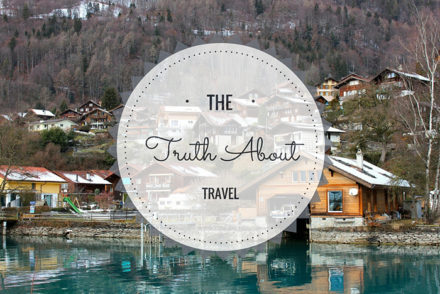
The Truth About Travel IX
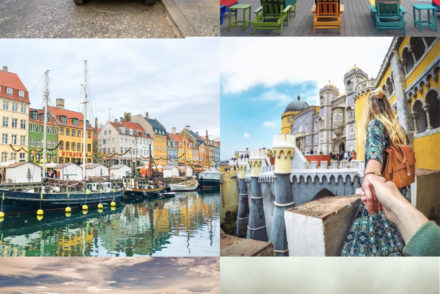
Six Places You Have To Visit In 2017
Family travel with a toddler

The Difference between Vacation and Travel

I recently read an excellent online article from The Atlantic about the dire financial straits that over 50% of all Americans find themselves in and something in the article struck me. The writer mentioned that because of the various financial choices he had made regarding his and his family’s finances, he and his family hadn’t been able to take a vacation in over 10 years. They instead sacrificed their retirement money to send their two daughters to excellent universities (Standford and Emery). I’m not at all criticizing that particular decision, because wanting your kids to attend the best schools is a noble thought, but I was instead curious with how casually the word “vacation” was thrown in there. I’ve noticed that a lot of Americans much prefer to use the word “vacation” than “travel.” Now, you may think to yourself, wait a second, it’s the same thing, just a different shade of the same color, but I’d argue that the difference between those two words runs far deeper than most people think.
- Think of the words vacation and travel.What images do those words conjure up?
Share this:
Think of the words vacation and travel. what images do those words conjure up.

Relaxation, stress-free, fun, lazy, easy
Explore, stressful, exciting, thrilling, scary, meaningful
Notice the vast ocean of difference between these two words. A typical vacation for a middle-class couple or family usually consists of something like this: 5 nights at either an all-inclusive or a nice resort in Mexico/Caribbean, or a cruise to Mexico/Caribbean, with maybe a safe shore excursion or two. Maybe a trip to Disneyworld in Orlando. People in these places are there purely to escape the rigors of work for a few days or a week, and don’t really want to exercise their mind too much, or be active. If given a choice between margaritas on a lazy river at a resort or a hiking trip in Jamaica, they’d choose the former 9 times out of 10.
Don’t get me wrong, I like cruises and all-inclusive resorts as well, but I flinch a little bit when people say, “Yeah, we went to Jamaica at “X” Resort and we loved it. Jamaica’s great.” I flinch because going to a nice resort where you exchange a few words about the weather with the hard-working and usually college-age local staff doesn’t really qualify as visiting anything. It’s not “seeing Jamaica” because these resorts are dime a dozen all around the Caribbean.
With a vacation, you know what you’re going to get. It’s fairly predictable. Pool, beach, drinks, buffet, more drinks, maybe dancing, day over. Travel is far more unpredictable, because you may miss your plane, your bus, you may (or will) forget an item or two, you may get sick because that sizzling kebab in the street cart looked really good, you may be helped or not helped by locals, you may get pickpocketed, you may get screwed by the rental car agency, and so on and so forth. And while I sometimes think it gets overstated, I do believe that travel truly does open you to other cultures, other viewpoints, and challenges your beliefs.
Nevertheless, I do believe that stress-free, fun vacation must be a part of people’s lives, but it shouldn’t completely exclude travel, and vice versa. It’s nice to lie by the pool and sip on a Bob Marley and enjoy the sun, but doing that every single day gets a little tiresome and narrows your cultural field of view. Go see a volcano, hike for six hours, tour a rainforest, explore an old fort or castle, talk to locals, eat local food.
Remember that the people who discovered the world didn’t take a vacation to La Florida or to the West Indies or to America. They were explorers. They were thrill-seekers. They were adventurers. Some of them were demented. Most were greedy. And what did they all have in common?
They were travelers.
- Click to share on Twitter (Opens in new window)
- Click to share on Facebook (Opens in new window)
- Click to share on Pinterest (Opens in new window)

You May Also Like

Lonely Planet Ultimate Travel List (Bottom 300)

2017 New York Times Travel Show Recap

A Slovak-Philippine Wedding: Part 2 – Ceremony
Leave a reply cancel reply.
This site uses Akismet to reduce spam. Learn how your comment data is processed .

- Post category: America's Road Trip Travel Blog / Blog
- Post published: April 15, 2019
- Post comments: 3 Comments
- Post author: Meredith Miller

Vacation vs. Trip: What Kind of Traveler Are You?
By: meredith miller published april 16, 2019, “a vacation is having nothing to do and all day to do it in.” – robert orben.
Lately, I’ve been getting asked questions that either go, “So, when’s your next vacation?” or, “So, when’s your next trip?” That got me thinking – we go on both – but are they actually the same thing? What is the difference between a trip and a vacation ?

To start, we should talk about the fundamental difference between the two.
It’s pretty easy; what sounds relaxing, and what sounds like it may require a little extra energy? It’s all about expectation.
A trip is something that we go on with expectations of having a purpose each day to see something new or be adventurous.
A vacation is all about rejuvenation. Most often, people go on vacations to relax and recover from the stress of their daily lives back home. The goal of vacations is to come home feeling refreshed and renewed.
Growing up, my family has always gone on trips. We would always spend a week or two camping in the Upper Peninsula in Michigan, but even those days were filled with bike rides, kayak trips, boat expeditions, hikes – you name it. Not so much sitting and relaxing; we were always moving.
The expectation of our trip each summer was to see and do new things; little to no time spent sitting around.

We grew up thinking sitting and relaxing on a beach was a nice vacation, but a “boring” trip. In reality, the people who choose to relax and refresh rather than swim in the ocean all day just plan their travels differently and have different expectations.
In conclusion, what kind of traveler are you? Are trips and vacations the same, or are they different?
To figure out what kind of traveler you are, you must ask yourself what your expectations are before you leave:
- What do I want to do while I’m gone?
- How do I want to feel after I come back home?
- What kinds of memories do I want to create for myself?
Decide what kind of experience you want to create for yourself, and go travel! Neither one is better than the other; they are just simply different. It’s always good to change things up, too. Maybe plan a hike one day, then sit by the beach the next.
Vacations focus on self-care, wellness, relaxing, and taking time to refresh.

The most beautiful thing in the world is, of course, the world itself.
In response to those who ask me when I’m going on a “trip” or “vacation” next; we go on both. Most of our trips are for work, but we do take a few vacation days off to enjoy where we are and to get the full experience of traveling to new places.

Check out some of my other blogs below!
Full-Time RV: “When Are You Going to Settle Down?”
Why Experiences Make Better Gifts
Ecotourism: What It Is, And Why You Should Try It
Think your business is the Best of The Interstate ? If so, reach out to us here !
Let's Get Social
- Click to print (Opens in new window)
- Click to share on Facebook (Opens in new window)
- Click to share on Twitter (Opens in new window)
- Click to share on Pinterest (Opens in new window)
- Click to share on Telegram (Opens in new window)
- Click to share on LinkedIn (Opens in new window)
- Click to share on Tumblr (Opens in new window)
- Click to share on Reddit (Opens in new window)
- Click to share on Pocket (Opens in new window)
- Click to share on Skype (Opens in new window)
- Click to share on WhatsApp (Opens in new window)
You Might Also Like

Famous Interstate 25 Art Installation ‘Equinox’ In Loveland, Colorado Near Two Official Best of The Interstate Destinations is Being Removed for Road Construction

“ENZO’S RISTORANTE ITALIANO” in Grand Junction Voted Best of The Interstate!

What is the ‘Best of the Interstate’?
This post has 3 comments.
Pingback: Camp A Way: The Best RV Resort in Nebraska | America's Road Trip and Best of The Interstate | Find Only The Best Interstate Travel Destinations
Pingback: What is The Best Season to Travel In? | America's Road Trip and Best of The Interstate | Find Only The Best Interstate Travel Destinations
Pingback: Amazing Ways To Save Money While Traveling | Best of The Interstate | Find The Best Interstate Travel Destinations
What Do You Think? Cancel reply

Your Wanderlust Is Inauthentic: The Real Difference Between Travel And Vacation
There’s a new trend of wanting to boast about one’s travels and describing oneself as having a case of “wanderlust.”
I think the real meaning and value of travel has been lost, however. Being a traveler does not mean expensive bikinis and EDM concerts at an all-inclusive resort in the Caribbean. If there are umbrella drinks involved, you probably went on a vacation, not on a genuine adventure.
Travel is being integrated into a culture that values diverting from the beaten path, talking to locals and exploring an area as one of a kind. Traveling means attempting to blend in and wanting to leave as an altered and more educated person.
Nothing is wrong with taking a vacation. Every so often, a voyage to a beach with clear water and air-conditioned accommodations is warranted. However, a trip that involves pool attendants and a concierge is not a cultural experience, per se.
Traveling means staying in hostels and befriending other travelers, as well as locals. It’s drinking at neighborhood bars and dives rather than rounding the tourist club circuit. It’s straying from tourist traps and sites and instead, searching for the more elusive history of a country and its people.
If you want to really travel, you must eat, drink and live as a local. Walk, bike and take public transportation. If there is a language barrier, learn key phrases and attempt to start and finish conversations in the native dialect. It may seem silly or arduous, but you’ll be appreciated for trying.
American tourists, in particular, have a terrible reputation for being obnoxious, inconsiderate and rude vacationers. Young people will push a map into a local’s face and say, “How do I get here?” without bothering to attempt the local language or even start with a greeting or small-talk. It’s because of these kinds of encounters that many vacationers return home saying that whatever country they visited hates Americans.
Well, what other countries don’t appreciate is ignorance — and Americans don’t like it, either. If a Spanish-speaker walked up to you in your city, thrust a brochure in your face and asked you for directions in Spanish, you’d probably be pretty put off. Learning to travel as a non-tourist and a non-vacationer will take you so much further in a foreign country and will lead to a more rewarding experience.
Real travel is not just about seeing new things, but also about seeing things with a new and refreshed perspective. It’s important to take a step back and simply enjoy the moments you spend visiting another country or place. Meditation and awareness can make a voyage incredibly fulfilling.
It’s also true that a genuine traveler will make as much of an impact on the place he or she is visiting as that place will make on him or her. Some of the greatest compliments I received while traveling ranged from my ability to fit in to the positive impression I left as a visiting American.
Many Americans will be substantially friendly with locals, but fail to be engaging. Being told that I’m relatable is a huge compliment and being embraced when I return to small bars is an incredible feeling.
There are millions of reasons to travel — really travel, not just vacation — and the thrill of integration is truly worth it. Traveling is more active than it is passive and it’s a great way to recharge to return as a new you. A vacation is easy to book -- domestic states like Florida and California aren’t going anywhere.
Get stamps on your passport and create your own life-changing experiences that will lead you to find happiness.
Photo via Tumblr

Understanding the Distinction: Travel, Trip, and Journey Explained
Zackary Hooper

Ever find yourself scratching your head over when to use ‘travel’, ‘trip’, or ‘journey’? Me too. In fact, these terms are commonly misused by even the most well-traveled folks among us.
Table of Contents
As an English language aficionado and travel enthusiast, I dove deep into linguistic resources to clear up this confusion once and for all. This blog will guide you through the nuances of these three words , helping you navigate your way to flawless English usage in any travel context .
Ready for departure?
Key Takeaways
- Travel refers to going to a place, especially far away.
- Trip involves traveling from one place to another, usually for a short period of time.
- Journey implies traveling from one place to another without necessarily returning.
- Proper usage of these terms is essential in effectively conveying our experiences.
Definition and Differences between Travel, Trip, and Journey
Travel is a verb that means going to a place, especially far away, while trip refers to the process of traveling from one place to another, usually for a short time. Journey, on the other hand, implies traveling from one place to another without necessarily returning.
Travel as a verb meaning to go to a place, especially far away
Travel, as a verb, emphasizes the act of moving from one location to another. This movement often involves significant distance between the two points. For instance, you might say you are traveling to Europe or Asia from America – places that are undoubtedly quite far from each other.
Notably, travel doesn’t always require a return trip; it merely notes the action of going somewhere far . Even voyages into space can be considered travel! So next time you utter “I love to travel,” note that this phrase speaks volumes about your passion for exploring distant destinations and embracing new experiences on a broader geographic scale .

Trip as the process of traveling from one place to another, usually for a short time
When we talk about a trip, we’re referring to the act of traveling from one place to another. It’s usually for a short period of time and involves moving between different locations .
Think of it as going on a vacation or taking a quick getaway. A trip can be as short as a day or extend over several days, but it generally doesn’t involve staying in one place for an extended period.
So whether you’re heading out on a road trip with friends or catching a flight to explore new cities, remember that a trip is all about the process of getting from point A to point B , enjoying the journey along the way.
Journey as traveling from one place to another, not necessarily returning
A journey is all about the experience of traveling from one place to another, without the expectation of returning . It can be a long and exciting adventure, with multiple destinations along the way.
Unlike a trip or travel, which often involves going somewhere and then coming back, a journey implies forward movement and exploration . It’s like embarking on a voyage of discovery, where you’re eager to see what lies ahead and open to new experiences.
Whether it’s backpacking through Europe or sailing around the world, a journey offers endless possibilities for exploration and self-discovery .
Common Uses and Examples of Travel, Trip, and Journey
– Travel: “I love traveling to different countries , experiencing new cultures and exploring exotic destinations.
– Trip: “We took a weekend trip to the beach, enjoying sun-kissed days and relaxing by the seaside.”
– Journey: “His journey across the desert was filled with challenges and self-discovery as he embarked on a soul-searching adventure.”
Travel: “I love to travel to different countries.”
I absolutely adore exploring different countries . Experiencing new cultures, trying unique cuisines , and immersing myself in unfamiliar landscapes is what makes travel so thrilling for me.
Whether it’s wandering through ancient ruins in Greece or hiking through the vibrant jungles of Costa Rica, I find immense joy in venturing beyond my comfort zone and discovering all that the world has to offer.
Travel opens my eyes to different perspectives and allows me to create lasting memories that I cherish forever.
Trip: “We went on a business trip to New York.”
Last week, I had the opportunity to go on a business trip to New York . It was an exciting experience that allowed me to explore the bustling city and meet with important clients . During the trip, we visited various companies , attended conferences , and even had some time to enjoy the sights and sounds of New York.
Being able to immerse myself in a different environment for a short period of time was both refreshing and educational. Overall, it was a successful trip that helped us strengthen our professional relationships and achieve our business goals.
Journey: “His journey around the world took him three years.”
I embarked on a three-year journey around the world, exploring new cultures and experiencing incredible adventures along the way. From bustling cities to remote villages, my journey allowed me to immerse myself in different landscapes and meet fascinating people from all walks of life.
It was a transformative experience that broadened my horizons and shaped my perspective on the world.
Clarifying Misuses of Travel, Trip, and Journey
Many people mistakenly use the term “travel” for short distances, but it should be reserved for going to faraway places. To understand the proper usage of these words, read on!
Incorrect uses of travel: “He traveled to the grocery store.”
Using the word “travel” to describe a short trip to the grocery store is incorrect. Travel usually refers to going to a distant place, especially far away. So, it’s important to use this term appropriately and not for everyday local trips like grocery stores.
Proper uses of the terms: “I traveled to Europe.”
I traveled to Europe for my summer vacation. It was an exciting travel experience filled with new cultures, delicious food, and breathtaking sights. The proper use of the term “travel” in this context refers to going somewhere far away , especially to a different country or continent .
In this case, I embarked on an adventure from my home country to Europe, immersing myself in each destination’s rich history and vibrant atmosphere. Traveling to Europe broadened my horizons and created memories that will last a lifetime.

Understanding the Nuances between Travel, Trip, and Journey
Travel, trip, and journey may seem similar, but they each have their own nuances. Read on to delve deeper into the distinctions between these terms and how to use them correctly in your everyday conversations.
Travel focuses on the action of going to a distant place.
Travel allows us to embark on exciting journeys to faraway destinations. It is the act of physically moving from one place to another , often to distant locations . Whether it’s exploring a new country , immersing ourselves in different cultures , or experiencing thrilling adventures , travel is all about the exhilarating action of venturing beyond our comfort zones .
So pack your bags and get ready for an incredible journey filled with unforgettable experiences!
Trip emphasizes the process of traveling and staying in a place.
A trip is all about the journey itself and the experience of being in a specific place . It focuses on the process of traveling from one location to another, while also emphasizing the time spent staying in that particular place.
Whether you’re taking a short weekend trip to a nearby city or embarking on a week-long vacation, a trip is about immersing yourself in new surroundings and enjoying everything that destination has to offer.
Journey implies a longer and more significant travel experience.
When embarking on a journey, you can expect a more extensive and meaningful travel experience . Unlike a simple trip or travel, a journey often involves exploring multiple destinations or pursuing a specific purpose .
It encompasses the idea of venturing into the unknown and embracing new challenges along the way. Whether it’s an epic road trip across several countries or a spiritual pilgrimage to sacred sites, a journey offers an opportunity for personal growth and transformation .
It allows you to immerse yourself in different cultures , navigate unfamiliar terrain, and create lasting memories. So if you’re seeking an adventure that goes beyond mere transportation from point A to point B, set out on a journey that will take you further and leave an indelible mark on your soul.
Conclusion and Importance of Using the Correct Terms
Understanding the distinctions between travel , trip, and journey is crucial in accurately conveying our experiences . By using these terms correctly, we can communicate more effectively and avoid confusion .
So whether we’re embarking on a short trip or a life-changing journey , let’s remember to use the right words to describe our adventures ! Keep exploring and keep traveling!
1. What is the difference between travel, trip, and journey?
Travel refers to the act of going from one place to another, while a trip is a specific instance of traveling for a particular purpose or destination. A journey, on the other hand, implies a longer and more meaningful experience that may involve personal growth or transformation.
2. Can you give examples of each term – travel, trip, and journey?
Sure! Travel can include activities like flying to a different country or taking a road trip across states. A trip could be going on vacation to Disneyland or visiting family over the holidays. And a journey might involve backpacking through Europe for several months or embarking on a spiritual retreat.
3. Is there any overlap between these terms?
Yes, there can be some overlap between these terms depending on context. For example, someone’s “trip” may also be considered their “journey” if it involves self-discovery or exploration. Similarly, long-term travel experiences may encompass both the notions of “travel” and “journey.”
4. How does understanding the distinction between these terms help in communication?
Understanding the distinction between travel, trip, and journey helps in effective communication as it allows us to accurately describe our experiences and intentions when discussing our travels with others. It provides clarity and avoids confusion by using appropriate terminology when sharing stories or making plans involving different types of travel experiences.
About the author

I’ve been fortunate to visit over fifty countries, each journey leaving a unique footprint on my life’s map. From bustling cities to serene nature trails, I’ve immersed myself in different cultures and experiences, constantly broadening my understanding of the world. On this site, I share my travel stories, tips, and insights, hoping to inspire others to embark on their own journeys. Join me as we uncover the beauty of our planet, one adventure at a time. Please reach out here if you need to get in touch.
Leave a Reply Cancel reply
Your email address will not be published. Required fields are marked *
Save my name, email, and website in this browser for the next time I comment.
Latest posts

The Importance of Responsible and Sustainable Travel for a Thriving World
Are you a travel enthusiast who craves for new experiences yet worries about the impact your adventures could have on our planet? You’re not alone. This blog post, rooted in research and experience, explores responsible and sustainable travel as a solution to this dilemma. It’s packed with insights on how to experience the world without…

Important Things to Keep in Mind While Traveling
Ever tried to navigate the complex world of planning a perfect trip and felt overwhelmed? I’ve been there too, overwhelmed by travel checklists, nervous about safety guidelines, and trying to balance out my luggage. Studies show that proper preparation can reduce travel stress significantly which led me to curate this guide to help you. This…

Transforming Travel for a Thriving World: The Importance of Good Travels
Are you keen on traveling but want to ensure your travels align with your values? I’ve been there, too. In fact, research shows that more and more people are interested in ethical tourism (Queiros, 2015). This article will introduce you to the concept of good travel and how it can contribute to a thriving world.…

What Is the Difference Between a Trip and a Vacation?
By Michael Ferguson
Have you ever wondered what the difference is between a trip and a vacation? While these two terms may seem interchangeable, there are actually some key differences between them that can impact your travel experience. In this article, we’ll explore the nuances of each term and help you determine which one is right for your next adventure.
The Definition of a Trip
A trip is typically defined as a journey or excursion, especially for pleasure. It can be a short or long journey, and it can involve traveling for business or leisure.
The emphasis of a trip is often on the destination rather than the journey itself. When you go on a trip, you typically have a specific purpose in mind, whether it’s to visit family and friends, attend an event, or see new sights.
What Makes a Trip Different from a Vacation?
While trips and vacations both involve traveling to new places, there are some key differences between them. One of the main differences is that vacations tend to be longer and more leisurely than trips.
When you go on vacation, you’re often looking to escape your daily routine and relax in a new environment. You may spend more time lounging by the pool or beach than actively exploring your destination.
Another difference between trips and vacations is that vacations are often planned well in advance with the intention of taking time off work or school. You may save up money specifically for your vacation and plan out all the details well ahead of time.
The Benefits of Taking Trips
While vacations can be great for relaxation and rejuvenation, there are also many benefits to taking trips. For one thing, trips allow you to explore new places and cultures more deeply than you might on a vacation. When you’re on a trip, you may have more time to immerse yourself in local activities like trying new foods, attending cultural events, or meeting new people.
Trips can also be a great way to break out of your comfort zone and challenge yourself. Whether you’re hiking a new trail, trying a new adventure sport, or navigating unfamiliar streets in a foreign city, traveling can help you build confidence and resilience.
How to Decide Between a Trip and a Vacation
Deciding whether to take a trip or a vacation ultimately depends on your personal preferences and goals for your travel experience. If you’re looking for relaxation and rejuvenation, a vacation may be the best choice for you. On the other hand, if you’re eager to explore new places and cultures more deeply, a trip might be the way to go.
Consider factors like how much time you have available, your budget, and what kind of activities you enjoy when deciding between a trip and vacation. Ultimately, the most important thing is that you choose an experience that will leave you feeling refreshed, inspired, and fulfilled.
In summary, while trips and vacations are both types of travel experiences, there are some key differences between them. Trips tend to be shorter and more focused on exploring new places and cultures, while vacations are often longer and more focused on relaxation.
10 Related Question Answers Found
What is the difference between trip and vacation, what is the difference between travel and vacation, what is the difference between vacation and vacations, what is the meaning of go on vacation, which is correct on vacation or in vacation, what does it mean to take a vacation, what describes a vacation, which is correct going on vacation or going for vacation, how do you describe a vacation, what does it mean to go on vacation, backpacking - budget travel - business travel - cruise ship - vacation - tourism - resort - cruise - road trip - destination wedding - tourist destination - best places, london - madrid - paris - prague - dubai - barcelona - rome.
© 2024 LuxuryTraveldiva

Vacation vs Trip – Best Comparison Between Trip & Vacation

The controversy over Vacation vs trip continues to rage among travellers; but, if you’re asking if there is a distinction between the two, I’d say yes. Despite the fact that most of us use these phrases interchangeably, I try to keep them separate as much as possible.
When my family and friends would brag (and sometimes moan) about how many “vacations” I took each year, I recognised the difference.
Although I travel frequently for pleasure, I calmly explained that not every “trip” is a “vacations,” and vice versa. Actually, when I think about it, I don’t take that many trips every year.
Table of Contents
The Difference Between Vacation and A Trip (Vacation vs Trip)
So, what’s the difference between a vacation as well as a trip? The difference is in your expectations. Trips are stuff you do, and they usually have a reason. Vacations, on the other side, are all about having fun. What exactly do we mean when we say this? So, let’s get started!
What is a Trip?
What do you think of as a trip? Our trips are planned. We have a schedule when We go for trip. I’d like to see and do something specific. It generally includes a cultural or educational element, and We always come back altered.
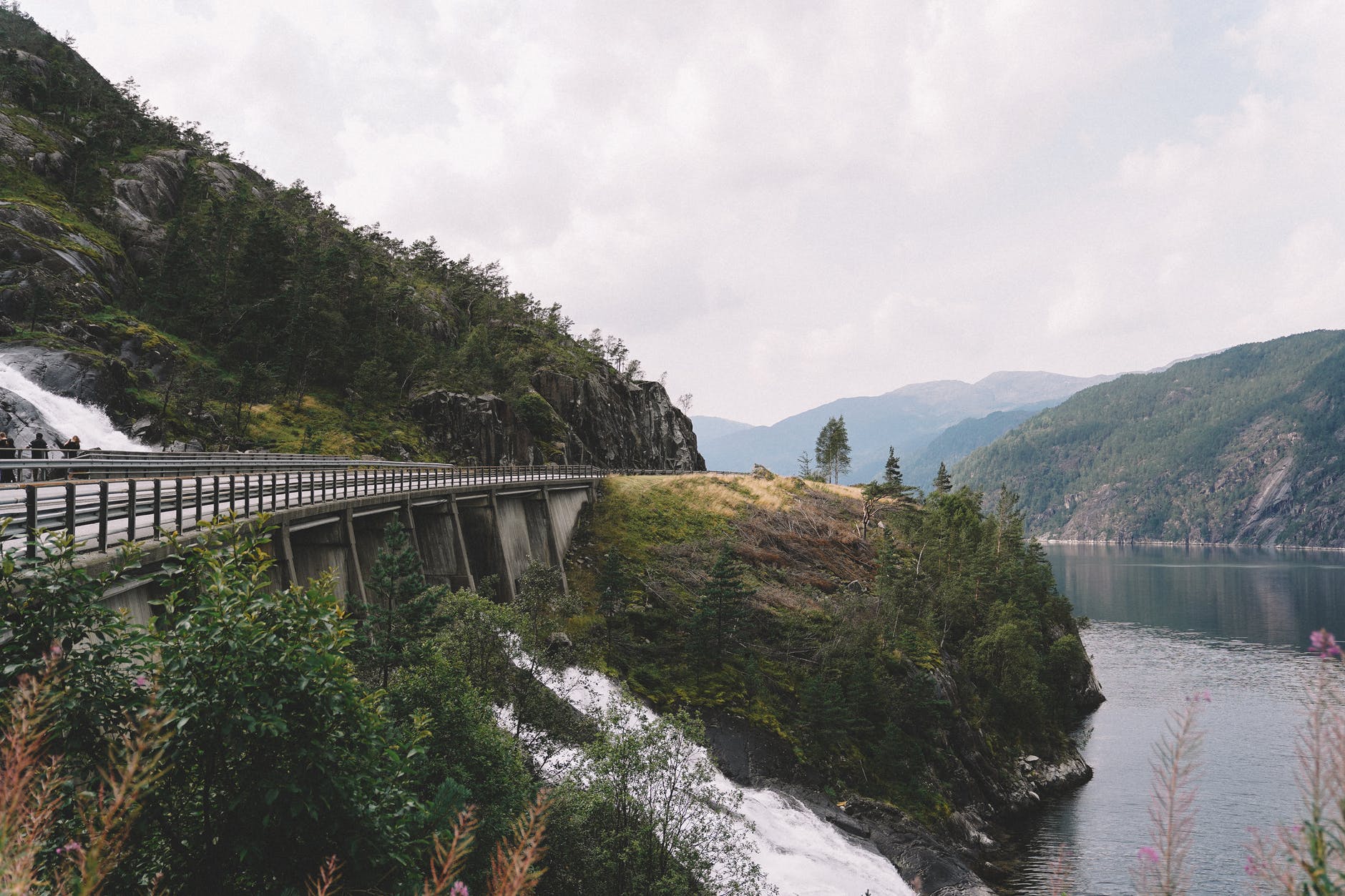
We concentrate a lot of my attention on the outside society while travelling, and We generally out visiting museums, visiting sights, speaking with people, and taking guided visits. On a journey, there is so much to explore and do.
In other words, while we are on a trip, we are really active. As a result of this, We normally have very little leisure.
Most of our weekend vacations to locations like Chicago and Stockholm are considered “short trips.” These quick trips might last anywhere from two to four days.
It was certainly a trip when we travelled up to Quebec City for a travel blogging conference. We drove an eight-hour round trip to the peak, attended the event, and then returned home (we had work the next day).
The moments of the trip when We were eating supper and dozing were the most enjoyable. When you go on vacations, you may find yourself stating, “I need a vacation from my vacation.”
When travelling, the most essential thing to consider is to identify what type of experience you desire.
International Trips
During our first visit to Dublin, Ireland, We intended to immerse myself in as much Irish culture as possible. We made arrangements to see the Cliffs of Moher, Glendalough, and Wicklow County by bus.

We took a free walking tour of Dublin and went to the Guinness Storehouse and Irish Whiskey Museum. Not to mention cultural attractions like the Kilmainham Gaol, where We learnt about the Irish struggle for independence — Would definitely suggest visiting Kilmainham Gaol.
We also went out a lot and went on bar crawls virtually every night. This was not a holiday, despite the fact that We took time off work to visit Ireland. This was a international trip.
What is a Vacation?
Vacations are not similar from trips in that they focus on the experience. Our vacations are largely devoted to self-care & wellbeing. Our primary goal on vacation is to unwind, recoup from the stresses of everyday life, and have fun.
We don’t have an agenda when we are on vacation, & we have n’t given any consideration to what I’ll do. We may get up late or early to go for a morning run because I’m on my own time.
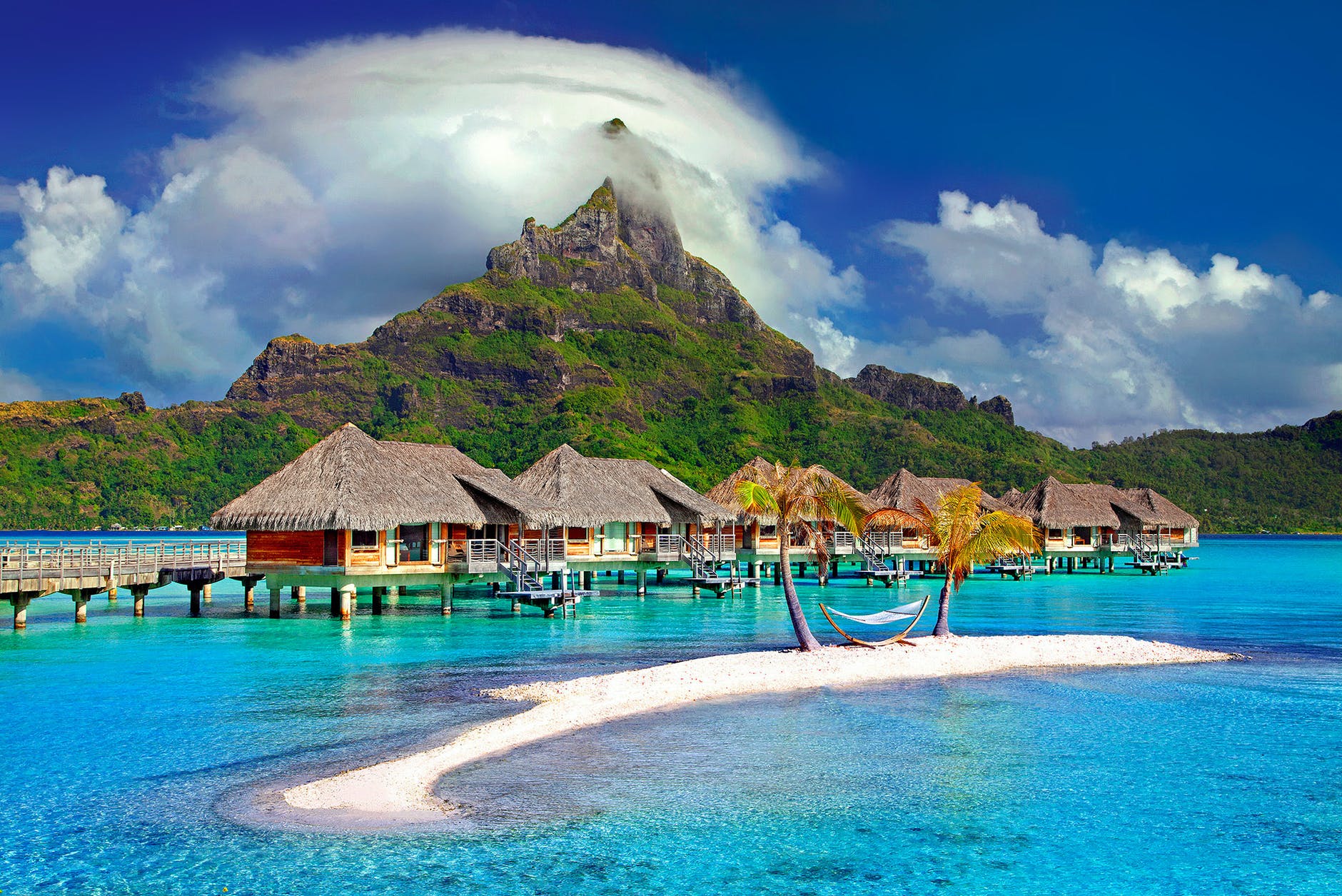
It all depends on how we are feeling at the time. That said, while we are on vacation, we normally don’t have a clear itinerary & we are not worried about anything or anyone. When we decide to take a trip, We don’t even carry my laptop with me.
We return home with a lovely glow, more flesh on my bones, and no bags under my eyes after a vacation. Our recent vacation to Bermuda was unquestionably enjoyable.
We chose not to work throughout my vacation, therefore We didn’t bring my laptop with me. We sent out an out-of-office notice and reserved a hotel with complimentary breakfast so that We wouldn’t have to go hungry in the mornings.
International Vacation
We spend a week in Grenada last year, and it’s one of my best vacations in a long time. We didn’t prepare anything ahead of time, except than arranging flights and an Airbnb.
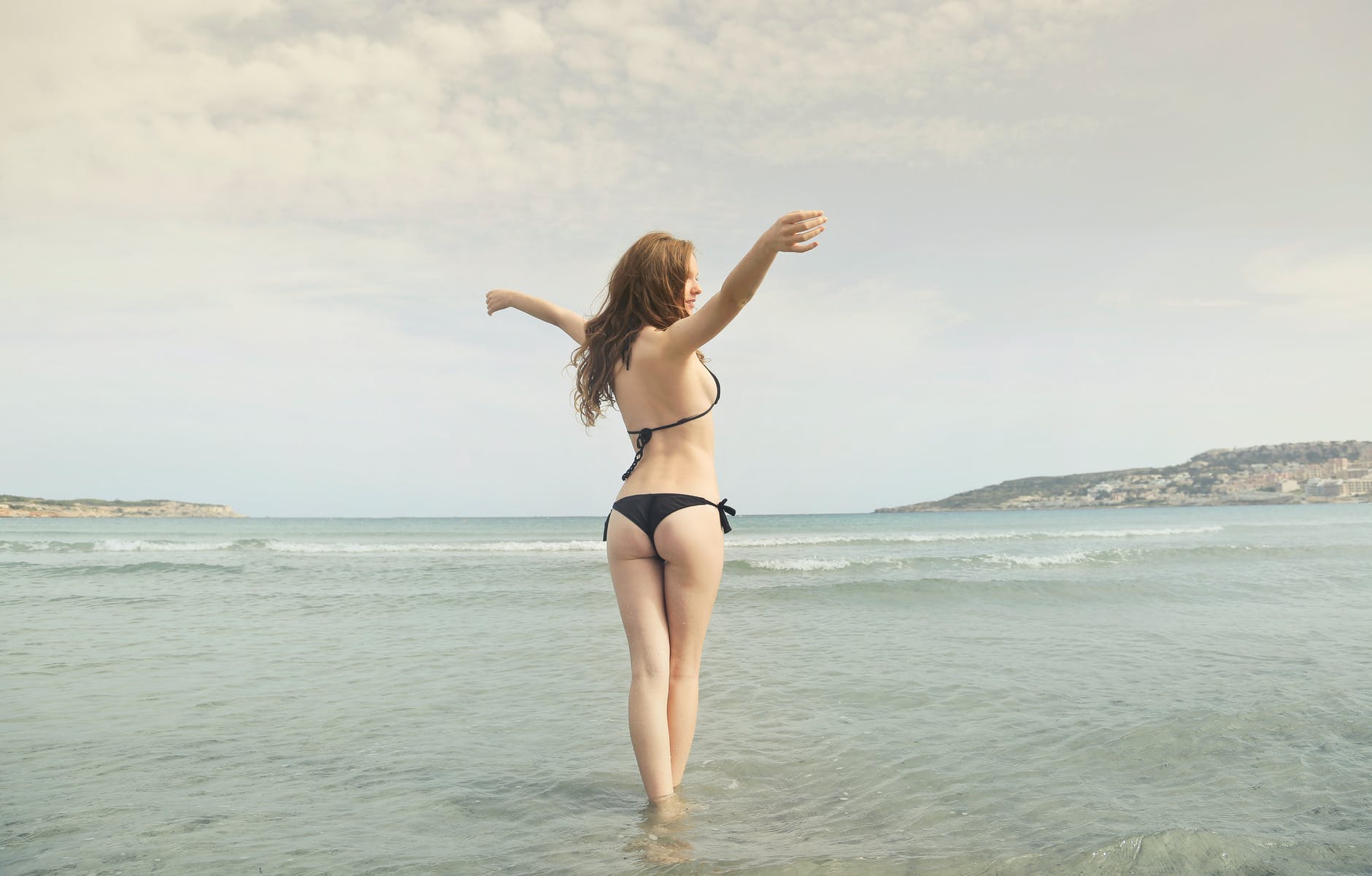
We merely booked a snorkelling excursion in Grenada and left my calendar open to go with the spirit. We ate a lot of Bajan fish cakes, and We were having the amazing time.
Bajan fish cakes are delicious! After a stressful quarter at work, a vacation in Grenada was exactly what We needed to refocus.
We would have had a dreadful time in Barbados if We had gone there expecting to do as much as We did in Dublin.
Trip vs vacation
So, what’s the conclusion on vacation vs. trip? Is there a difference between them or are they the same? Trips and vacations will mean various things to different individuals, so we recommend that you figure out what you want to get out of them.
Why do you wish to travel to a new location? Are you visiting for the cuisine, the culture, or the sights? Or are you going to unwind, reconnect with nature, or get some rest? There will be no condemnation.
This isn’t to say that trips can’t have a vacation component, or that vacations can’t include a trip component, but the fundamental difference between the two is your expectation and goal.
How to decide Trip Vs Vacation?
Ask yourself the below questions to help you decide whether or not you want to go on a vacation vs road trip :
- What exactly do I want to do with my time off?
- What kind of feelings do I wish to have during and after my trip?
- What brings me joy? What can I do to do more of it when I’m on the road?
- What do I want to take home with me, whether it’s a better grasp of culture, a lovely tan, or a memento from an event?
We all travel in various ways, but if you want to get a taste of both, consider spending some days lazing on the beach and others seeing sites.
There may be some overlap between what you consider to be your ideal trip or vacation, and that’s OK. Remember, it’s your vacation, and you’ve worked hard for it.
Go out there and do anything you want with your leisure time. Simply pick what type of experience you want to have before you leave – do you need to go on a trip or take a vacation?
Other Interesting Blogs Related to Vacation vs Trip
15 Best Casinos in Mexico For A Vacation
11 Best Travel Movies
What to Wear on Honeymoon Night?
FAQ About Trip vs Vacation
Does vacation mean travelling.
Vacation refers to leisure travel in English-speaking North America, such as a brief pleasure vacation or a trip overseas. In Commonwealth nations, the phrase “holiday” is used to refer to both a leave of absence from work and a vacation or excursion. Staying at home or travelling anywhere might be considered a vacation.
What is considered a trip?
The party was a trip since it consisted of a single round or tour on a business errand or an interesting or uncommon encounter.
What is the synonym of trip?
Expedition, journey and passage are synonym of Trip.
When a woman is tripping meaning?
Woman is tripping is used to express your belief that someone is insane or acting in an illogical manner. If she believes she can afford an apartment in Manhattan, she’s crazy.
What is short trip called?
A pleasure trip, particularly one that lasts less than a day. excursion, jaunt, and expedition are all words that can be used to describe a trip.
Usatrippers
We are dedicated to offering a professional service to our clients at USA Trippers. Assuring that clients benefit from our expertise, as well as our distinct style and passion. We want to make a contribution in everything we do as a highly visible, entrepreneurial, and innovative travel company.
Leave a Comment Cancel reply
Save my name, email, and website in this browser for the next time I comment.
Travel vs Trip – Difference
What is the difference between Travel and Trip?
These two words frequently confuse learners of English.
A quick explanation that is valid for most situations is the following:
Travel – a verb (the action) Trip – a noun
Susan’s husband isn’t in town at the moment; he is on a business trip . He travels to many different countries. Susan met her husband on a trip to the Bahamas.
Travel – to go from one place to another Trip – a journey that is often for a short period of time.
NOTE: There are some exceptions to the general rule above.
Travel can also be a noun when it refers to the act of traveling.
- Travel is difficult in that part of the country since there are no paved roads.
- Travel broadens your mind.
Sometimes Travel appears in plural form and in that case is normally preceded by a possessive adjective (my travels, his travels etc.)
- She has had many adventures in her travels .
- I have never seen any as strange as that in all of my travels .
Trip can also be a verb though it has a completely different meaning. To Trip – to accidentally stumble and almost fall while walking or running, usually after catching your foot on something.
- He didn’t see the cat and he tripped up.
Trip vs. Journey
A trip usually refers to traveling to a place and returning back to where you started. A journey usually implies traveling from one place to another (not necessarily returning to where you started). It sometimes refers to the length of time taken to go from one place to another.
- They went on a journey through South America that lasted 6 months.
- It is a three-day journey by train.
Some more uses of the word Trip
A day trip usually refers to a tourist activity that occupies your entire day. A business trip is when you travel for business reasons. A round trip means to travel somewhere and return to place of original, there and back (= a return trip)
Summary Chart
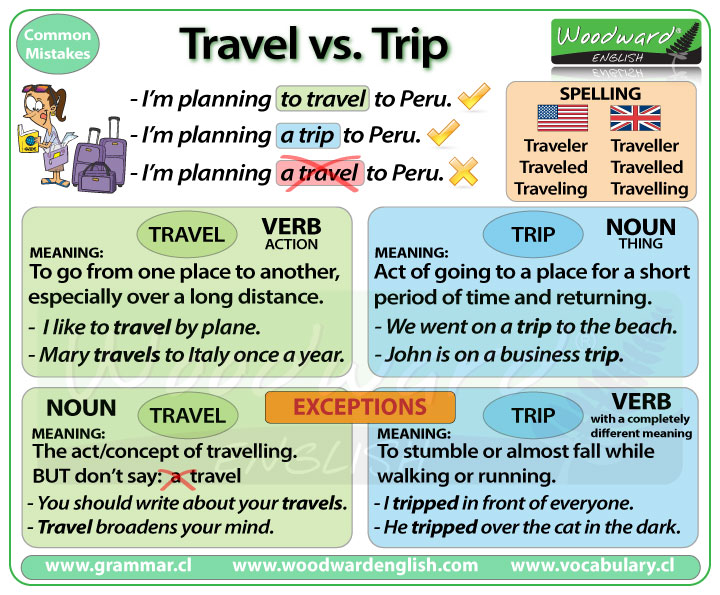
What is the best trip you have ever had?
- 934k Followers
- 214k Followers
- 104k Followers
FREE English Courses

Pin It on Pinterest
Travel vs. Tourism: What's the Difference?
Key Differences
Comparison chart, economic implication, duration & distance, associated activities, travel and tourism definitions, what is travel, how does tourism differ, what industries support travel, can all travel be considered tourism, how important are travel reviews for tourism, how does tourism benefit a region, is traveling overseas always considered tourism, what factors affect travel choices, why is sustainable tourism important, what's the significance of world tourism day, why do some people prefer solo travel, what's the difference between a tourist and a traveler, is adventure tourism a subset of travel or tourism, can a business trip be considered tourism, how do travel advisories impact tourism, can tourism be local, how has digital technology impacted travel, how does climate impact travel and tourism, are there different types of tourism, how has the covid-19 pandemic affected travel and tourism.

Trending Comparisons

Popular Comparisons

New Comparisons

Winter is here! Check out the winter wonderlands at these 5 amazing winter destinations in Montana
- Travel Tips
What Is The Difference Between Staycation And Vacation
Published: November 15, 2023
Modified: December 28, 2023
by Grata Christian
- Hotel Reviews
- Plan Your Trip
Introduction
When it comes to planning a getaway, there are a few options to consider – staycation or vacation. These terms are often used interchangeably, but they actually have distinct differences. Understanding these differences can help you make a more informed decision about how to best spend your time off.
A staycation is a term that has gained popularity in recent years. It refers to taking time off from work or daily responsibilities and staying at or near home instead of traveling to a different location. On the other hand, a vacation involves leaving your home and traveling to a different destination, whether it’s within your country or abroad.
Both staycations and vacations serve the purpose of providing rest and relaxation, but they offer distinct advantages and disadvantages. The duration, cost, location, and activities involved can vary significantly between the two. In this article, we will explore the differences between staycations and vacations, helping you make an informed decision about how to spend your well-deserved time off.
Definition of Staycation
A staycation refers to a period of time when an individual or a family takes time off work or their regular responsibilities and stays at or near their home instead of traveling to a different location. It is a combination of the words “stay” and “vacation,” indicating that the person is taking a break from their routine without leaving their immediate surroundings.
A staycation can take place in various forms. Some individuals may choose to stay at home and engage in activities that they usually don’t have time for, such as reading, gardening, or completing home improvement projects. Others may opt to stay in a hotel or a local rental property to create a more vacation-like atmosphere while still staying close to home.
The primary idea behind a staycation is to relax and recharge without the stress and expense of traveling. It allows individuals to take a break from their everyday routine and explore their local area, discovering hidden gems and attractions they may have overlooked. Additionally, a staycation can also be a perfect opportunity to spend quality time with family and friends or to pursue personal hobbies and interests.
One of the key aspects of a staycation is the flexibility it provides. Unlike a vacation that involves extensive planning, travel arrangements, and time constraints, a staycation can be spontaneous and adaptable. Individuals have the freedom to choose how they spend their time, whether it’s exploring local attractions, visiting nearby parks and museums, or simply enjoying leisure activities in the comfort of their own home.
In recent years, staycations have become increasingly popular for several reasons. They are often more budget-friendly, as they eliminate the costs associated with travel and accommodation. Staycations also minimize the stress and hassle of packing, long journeys, and adapting to a new environment. Additionally, they promote sustainability by reducing carbon emissions associated with travel.
Definition of Vacation
A vacation is a period of time when individuals or families take a break from work or their regular responsibilities and travel to a different destination, typically outside of their daily environment. It is a time to relax, unwind, and explore new places, cultures, and experiences.
Unlike a staycation, which involves staying close to home, a vacation often entails traveling to a different city, country, or even continent. Individuals may choose to go on vacations for various reasons, such as celebrating special occasions, exploring new destinations, or simply taking a break from their routine.
One of the defining characteristics of a vacation is the element of travel. It involves planning and making arrangements for transportation, such as flights, trains, or road trips. Accommodation is also a crucial aspect of a vacation, with individuals opting for hotels, resorts, vacation rentals, or even camping in some cases.
Durations of vacations can vary depending on personal preferences and available time off. Some vacationers may take short trips, lasting a few days or a week, while others may embark on extended journeys that span several weeks or even months. The length of a vacation often depends on factors such as budget, destination, and personal obligations.
During a vacation, individuals have the opportunity to immerse themselves in new environments, cultures, and activities. This may include sightseeing, visiting historical landmarks, exploring natural attractions, trying local cuisine, or engaging in adventure and outdoor activities. The purpose of a vacation is not only to relax but also to broaden one’s horizons and create lasting memories.
Vacations can be planned and organized well in advance or can also be spontaneous trips taken on a whim. They provide individuals with a break from their daily routines, allowing them to disconnect from work and responsibilities. This time away from the regular grind enables individuals to recharge, de-stress, and rejuvenate their mind, body, and spirit.
It is worth noting that vacations often come with a higher price tag compared to staycations. Factors such as transportation, accommodation, meals, and activities contribute to the overall cost of a vacation. However, the expenses are often justified by the unique experiences, adventures, and cultural enrichment that vacations provide.
Purpose of a Staycation
The purpose of a staycation is to take a break from work or daily responsibilities while staying at or near home. While the concept of a staycation is often associated with relaxing and unwinding, it serves several other purposes as well.
1. Relaxation and rejuvenation: One of the primary purposes of a staycation is to provide individuals with the opportunity to relax and rejuvenate. It allows them to step away from their regular routine, recharge their batteries, and reduce stress. Whether it involves lounging at home, enjoying a spa day, or taking leisurely walks in the local area, a staycation creates a peaceful environment conducive to relaxation.
2. Quality time with loved ones: Another purpose of a staycation is to spend quality time with family and friends. Without the distractions and time constraints of work or other obligations, individuals can fully engage in meaningful interactions and create lasting memories. It provides an opportunity for bonding, strengthening relationships, and fostering a sense of togetherness.
3. Exploring the local area: A staycation allows individuals to become tourists in their own city or town. With a fresh perspective, they can explore local attractions, visit museums, parks, and landmarks, and learn more about the history and culture of their community. This not only provides a sense of discovery and adventure but also cultivates a deeper appreciation for the place they call home.
4. Pursuing personal interests: A staycation offers individuals the chance to indulge in activities and hobbies they may not have time for during their regular routine. Whether it’s reading, painting, gardening, cooking, or engaging in sports and outdoor activities, a staycation allows individuals to pursue their passions and interests at their own pace.
5. Saving money: Compared to a traditional vacation, a staycation offers a more cost-effective option. By avoiding travel expenses, accommodation costs, and dining out, individuals can save a significant amount of money. This can be particularly beneficial for those on a budget or who prefer to allocate their resources elsewhere.
Overall, the purpose of a staycation is to provide a break from the everyday routine and create a rejuvenating and enjoyable experience without the need for extensive travel. It allows individuals to prioritize self-care, spend quality time with loved ones, explore their local surroundings, and pursue personal interests at their own pace.
Purpose of a Vacation
The purpose of a vacation is to take a break from work or daily responsibilities and travel to a different destination. While the specific reasons for going on a vacation may vary from person to person, there are several common purposes that vacations serve:
1. Exploration and adventure: One of the primary purposes of a vacation is to explore new places and engage in exciting adventures. Whether it’s visiting historical sites, experiencing different cultures, or exploring breathtaking natural landscapes, vacations provide opportunities for discovery and broaden one’s horizons. It allows individuals to step out of their comfort zones and create memorable experiences.
2. Rest and relaxation: Vacations offer individuals a chance to rest and recharge away from their everyday routines. It provides a break from work-related stress, allowing individuals to disconnect and focus on their well-being. Whether lounging on a beach, indulging in spa treatments, or practicing meditation in serene surroundings, vacations foster a sense of tranquility and rejuvenation.
3. Quality time with loved ones: Vacations provide an excellent opportunity for creating lasting memories with family and friends. By spending uninterrupted time together in a new environment, individuals can strengthen bonds and deepen relationships. Whether it’s a romantic getaway with a partner, a family vacation, or a trip with close friends, vacations foster connections and create shared experiences.
4. Cultural enrichment: One of the purposes of a vacation is to immerse oneself in different cultures and gain a deeper understanding of the world. It allows individuals to appreciate diverse traditions, cuisines, arts, and customs. By experiencing new cultures firsthand, vacations promote tolerance, broaden perspectives, and promote personal growth.
5. Escape and rejuvenation: Vacations offer individuals an escape from the mundane and a chance to rejuvenate their mind, body, and spirit. The change of scenery and routine can provide a much-needed break, enabling individuals to return to their daily lives with a renewed sense of energy and motivation. It allows individuals to disconnect from work-related responsibilities and obligations, promoting overall well-being and mental clarity.
6. Adventure and thrill-seeking: For some individuals, the purpose of a vacation is to seek adventure and engage in thrilling activities. Whether it’s hiking, skiing, scuba diving, or other adrenaline-pumping pursuits, vacations provide opportunities for adrenaline junkies to fulfill their sense of adventure and satisfy their desire for excitement.
Vacations serve various purposes, ranging from relaxation and exploration to cultural enrichment and rejuvenation. The specific purpose of a vacation may vary depending on individual preferences and goals, but ultimately, it provides an opportunity to step away from the ordinary and create memorable experiences in new and exciting destinations.
Duration of a Staycation
The duration of a staycation can vary depending on individual preferences, availability of time off, and personal circumstances. Unlike a vacation, which often involves traveling to a different destination and may be subject to time constraints, staycations offer more flexibility in terms of duration.
Staycations can range from a few days to several weeks or even longer. Some individuals may choose to take a short break, such as a long weekend, to relax and rejuvenate without the need for extensive time off from work. Others may opt for a week or two, allowing for a more extended period of rest and exploration within their local area.
One of the benefits of a staycation is the ability to customize the duration based on personal preferences and availability. Unlike a traditional vacation, which may require extensive planning and time off, staycations can be more easily adjusted to fit within individuals’ schedules and commitments.
Shorter staycations of a few days can be ideal for individuals who are looking for a quick escape from their regular routine and want to recharge without taking extensive time off work. It allows them to disconnect for a brief period, enjoy leisurely activities, and return to their regular responsibilities feeling refreshed.
On the other hand, longer staycations of a week or more offer individuals the opportunity to fully immerse themselves in the experience. It provides more time to explore local attractions, engage in various activities, spend quality time with loved ones, and truly unwind without the pressure of time constraints.
The duration of a staycation can also be influenced by factors such as budget and availability of resources. Longer staycations may require more financial planning and preparation to account for additional expenses, such as dining out or participating in paid activities. Individuals with limited resources may opt for shorter staycations that fit within their budget constraints.
Overall, the duration of a staycation is a personal choice that depends on individual preferences, availability of time off, and budget considerations. Whether it’s a brief escape or an extended period of relaxation and exploration, staycations offer the flexibility to customize the duration to best suit individual needs and circumstances.
Duration of a Vacation
The duration of a vacation can vary significantly depending on individual preferences, available time off, and the destination being traveled to. Unlike staycations that offer flexibility in duration, vacations often require more planning and are subject to time constraints.
Vacations can range from short trips of a few days to extended journeys lasting several weeks or even months. The duration of a vacation is influenced by various factors, including budget, travel distance, and the desire to explore the chosen destination adequately.
Short vacations, typically lasting a few days, are ideal for individuals who want to take a quick break from their routine and enjoy a change of scenery. These short trips are often popular for weekend getaways, city breaks, or visiting nearby attractions. Even though the duration is relatively brief, short vacations can still offer a rejuvenating and memorable experience.
Week-long vacations are a popular choice for individuals who have a bit more time to spare and want to delve deeper into their destination. This duration allows for more leisurely exploration, including visiting multiple attractions, indulging in local cuisine, and immersing oneself in the local culture. Week-long vacations strike a balance between having sufficient time to enjoy the vacation experience and accommodating other commitments.
Extended vacations, ranging from a couple of weeks to several months, are typically undertaken by travelers with the desire to fully immerse themselves in a new environment. These vacations often involve international travel, exploring different regions or countries, and experiencing various cultures. Extended vacations provide ample time to engage in activities, form deeper connections with locals, and have a more in-depth appreciation of the destination.
The chosen destination also influences the duration of a vacation. For example, a short-haul trip to a nearby city may warrant a shorter vacation duration, while long-haul destinations like remote islands or international adventures may require more time to reach and explore.
It is important to take into account personal factors, such as work and other commitments, when planning the duration of a vacation. Ensuring that there is enough time to travel to and from the destination, as well as allowing for rest and recovery upon return, is essential.
Ultimately, the duration of a vacation is a personal choice influenced by various factors. It is important to strike a balance between the desire to fully experience the destination and the availability of time, resources, and personal obligations. Whether it’s a brief getaway or an extended adventure, vacations provide an opportunity to relax, explore, and create cherished memories.
Cost of a Staycation
One of the advantages of a staycation is its affordability compared to traditional vacations. The cost of a staycation can vary depending on individual choices and preferences, but it generally tends to be lower due to the elimination of travel expenses and reduced accommodation costs.
When it comes to the cost of a staycation, there are several factors to consider:
1. Accommodation: If individuals choose to stay at home during their staycation, the accommodation cost is minimal or nonexistent. However, some people may prefer to book a local hotel or vacation rental to enhance the vacation-like experience. Even in such cases, the accommodation costs are typically lower than those of a vacation in a different destination.
2. Transportation: One of the significant advantages of a staycation is that it eliminates the need for costly transportation. Individuals can avoid expenses related to flights, train tickets, or long-distance road trips. Instead, they can use public transportation or drive short distances to explore their local area.
3. Meals and dining: During a staycation, individuals have the option to cook and prepare their meals at home, reducing dining expenses. It allows them to create their favorite dishes or explore local grocery stores and markets for fresh and affordable ingredients. Alternatively, they can choose to dine out occasionally, exploring local eateries without the need for expensive restaurant meals every day.
4. Activities and entertainment: Staycations offer the flexibility to choose low-cost or free activities and entertainment options. Individuals can explore local parks, museums, and attractions that may offer discounted or affordable entry fees. They can also take advantage of community events, festivals, or free outdoor activities in their area.
5. Souvenirs and shopping: Unlike traditional vacations, staycations often involve minimal spending on souvenirs and shopping. Individuals can focus on experiences rather than material items. However, if individuals choose to indulge in shopping during their staycation, they can benefit from exploring local shops, markets, or outlets that may offer affordable options.
Overall, the cost of a staycation can be significantly lower compared to a vacation. By eliminating or reducing travel and accommodation expenses, individuals can enjoy a budget-friendly break without sacrificing relaxation and enjoyment. Staycations are ideal for those who want to take a vacation while being mindful of their finances.
Cost of a Vacation
When it comes to vacations, the cost can vary widely depending on factors such as the chosen destination, duration of the trip, mode of transportation, accommodation, dining, and activities. Unlike staycations, vacations often involve additional expenses due to travel and exploring new locations. It’s important to consider these costs when planning a vacation:
1. Travel expenses: One of the significant costs associated with vacations is transportation. This includes airfare, train or bus tickets, or the cost of gasoline for road trips. Depending on the distance and the mode of transportation chosen, travel expenses can vary greatly. International flights and long-haul journeys typically incur higher costs compared to shorter domestic trips.
2. Accommodation: The cost of accommodation is another significant expense during a vacation. It can vary depending on the type of lodging chosen, such as hotels, resorts, vacation rentals, or camping sites. Factors such as location, amenities, and seasonality can also impact accommodation costs. Additionally, longer vacations may require multiple accommodations, further adding to the overall expense.
3. Dining and meals: Dining expenses can also contribute to the cost of a vacation. Eating out at restaurants or trying local cuisine can be a delightful part of the vacation experience, but it can also add up quickly. Individuals who prefer to dine at gourmet restaurants or indulge in fine dining will incur higher costs compared to those who opt for budget-friendly options or self-catering accommodation with cooking facilities.
4. Activities and attractions: Another factor influencing the cost of a vacation is the activities and attractions individuals choose to participate in. Entrance fees to museums, theme parks, guided tours, and adventure activities can vary. It’s important to budget for these expenses and prioritize activities based on personal preferences and interests.
5. Souvenirs and shopping: Vacations often involve the temptation to purchase souvenirs or indulge in shopping to commemorate the trip. While these expenses may not be necessary, they often add to the overall cost. Setting a budget for souvenirs and being mindful of unnecessary purchases can help manage the cost during a vacation.
6. Currency exchange and transaction fees: If traveling to a different country, it’s essential to consider currency exchange rates and potential transaction fees when using credit cards or withdrawing cash abroad. These costs can impact the overall expense of a vacation.
It’s important to note that the cost of a vacation can be highly variable and subject to personal choices and preferences. Budget-conscious travelers can opt for cost-saving measures such as opting for more affordable accommodations, dining at local establishments, researching free or low-cost activities, and being mindful of incidental expenses.
Overall, the cost of a vacation can vary greatly depending on destination, duration, accommodation choices, dining preferences, and desired activities. It’s important to plan and budget accordingly to ensure a memorable vacation experience within one’s financial means.
Location of a Staycation
The location of a staycation refers to the place where individuals choose to spend their time off or relaxation period while staying close to home. Staycations offer the flexibility to explore and enjoy various locations within one’s local area or within a short distance from home.
When it comes to the location of a staycation, individuals have a wide range of choices depending on their preferences and interests. Here are a few options to consider:
1. Home: Many individuals choose to have a staycation within the comfort of their own home. This allows them to create a relaxing environment without the need to travel or change their surroundings. They can engage in activities such as self-care, reading, watching movies, or simply enjoying quality time with family and friends.
2. Local attractions: Staycations offer the opportunity to explore and appreciate local attractions that may often be overlooked in day-to-day life. This can include visits to nearby museums, art galleries, historical landmarks, botanical gardens, or parks. Individuals can investigate their own local area to discover hidden gems or engage in activities they may not have had time for previously.
3. Outdoor activities: For those who enjoy nature and outdoor adventures, staycations can be an opportunity to explore nearby natural environments. This can include visiting local parks, hiking trails, lakes, or beaches for activities such as picnicking, hiking, cycling, swimming, or simply enjoying the beauty of nature.
4. Nearby towns or cities: Staycations provide the chance to visit neighboring towns or cities within a short distance. This allows individuals to experience a change of scenery and immerse themselves in a different atmosphere without the need for lengthy travel. Exploring nearby towns can involve discovering local shops, restaurants, cultural festivals, or events that offer a fresh perspective.
5. Day trips: Another option for a staycation is to plan day trips to nearby destinations. Individuals can select attractions or sights located within a few hours’ drive, allowing them to experience a mini getaway without staying overnight. This can involve visiting amusement parks, wildlife sanctuaries, scenic drives, or nearby tourist destinations.
The location of a staycation largely depends on an individual’s preferences, interests, and the availability of nearby attractions. It offers the opportunity to discover and appreciate the local surroundings, supporting the community and promoting a sense of familiarity and connection.
By choosing a location that is easily accessible and appealing, individuals can embark on a staycation that brings relaxation and enjoyment without the need for extensive travel or being far away from home.
Location of a Vacation
The location of a vacation refers to the destination chosen by individuals to travel to for their time off and relaxation. Vacations offer the opportunity to explore and experience new locations, whether within one’s home country or abroad.
When it comes to the location of a vacation, individuals have a multitude of options based on their interests, preferences, and desired experiences. Here are a few possibilities to consider:
1. Domestic destinations: Vacations within one’s own country offer the chance to explore the diverse landscapes, cultures, and cities within a familiar setting. This can involve trips to popular tourist destinations, coastal getaways, national parks, historical landmarks, or vibrant urban centers. Exploring domestic locations can provide a deeper understanding and appreciation of one’s own country and its unique characteristics.
2. International destinations: Traveling to international locations widens the scope of vacation opportunities. It allows individuals to experience different cultures, cuisines, languages, and natural wonders. International vacations can range from beach destinations in tropical paradises, city breaks in bustling metropolises, adventure activities in remote locations, or cultural explorations in historical landmarks and heritage sites.
3. Off-the-beaten-path locations: For those seeking unique and less crowded experiences, opting for off-the-beaten-path locations can provide a sense of adventure and discovery. This can involve exploring lesser-known destinations, remote islands, small towns, or hidden gems that are not as heavily frequented by tourists. These locations often offer a more authentic and intimate experience, allowing individuals to immerse themselves in the local culture and surroundings.
4. Nature and wilderness destinations: Vacations can also revolve around the beauty of nature and wilderness. This can include trips to national parks, mountains, forests, lakes, or natural reserves that offer breathtaking landscapes and opportunities for hiking, camping, wildlife spotting, or other outdoor activities. Nature-focused vacations allow individuals to reconnect with nature and rejuvenate in serene surroundings.
5. Cultural and historical destinations: Some individuals choose vacations that focus on cultural enrichment and historical exploration. This involves visiting cities and regions known for their rich history, ancient ruins, museums, art galleries, and architectural wonders. Immersing oneself in different cultures and learning about diverse traditions can be a fascinating and educational experience.
The location of a vacation largely depends on personal preferences, interests, budget, and the desire for specific experiences. The world offers a vast array of destinations, each with its own unique attractions and charm. Whether individuals opt for nearby destinations or far-flung locations, the choice of the vacation destination allows them to create memorable experiences and broaden their horizons.
Activities during a Staycation
One of the great advantages of a staycation is the variety of activities individuals can engage in without the need for extensive travel. While staying close to home, individuals can find numerous ways to make their staycation enjoyable and fulfilling. Here are some activities that can be part of a staycation experience:
1. Relaxation and self-care: Staycations provide an opportunity to prioritize self-care and relaxation. This can involve activities such as taking long baths, practicing meditation or yoga, enjoying spa treatments at home, reading books, or simply unwinding in comfort. Creating a peaceful environment and dedicating time to focus on personal well-being can be rejuvenating during a staycation.
2. Exploring local attractions: Staycations offer a chance to appreciate the local area and visit nearby attractions or landmarks. This can include exploring museums, art galleries, botanical gardens, or historical sites that may have been overlooked during daily routines. It provides an opportunity to delve deeper into one’s own community, learn about its history and culture, and discover hidden gems.
3. Outdoor adventures: Staycations can involve outdoor activities that allow individuals to enjoy nature and fresh air. This can range from leisurely walks or bike rides in local parks or nature reserves to more adventurous activities such as hiking, camping, or boating. Engaging in outdoor adventures during a staycation provides an opportunity to connect with nature and experience the beauty of the local environment.
4. Quality time with family and friends: Staycations are an excellent opportunity to spend quality time with loved ones. Whether it’s organizing a movie night, having a picnic in the park, playing board games, or cooking together, a staycation allows for uninterrupted bonding and creating memories with family and friends. It’s a chance to strengthen relationships and enjoy meaningful interactions.
5. Trying new hobbies or activities: Staycations are an ideal time to explore new hobbies or activities that one may not have had time for during regular routines. This can involve cooking new recipes, practicing a musical instrument, painting or drawing, learning a new language, or engaging in DIY projects. The flexibility of a staycation allows individuals to pursue their interests at their own pace without the pressure of timetables.
6. Virtual experiences and learning: With advancements in technology, individuals can also incorporate virtual experiences and learning into their staycation. This can involve taking online classes or workshops, virtually visiting museums or cultural sites, or participating in virtual tours of famous destinations around the world. These activities provide a sense of exploration and learning from the comfort of home.
7. Enjoying local cuisine: Staycations offer the opportunity to explore local culinary delights. Individuals can try new restaurants, order takeout from local eateries, or even experiment with cooking recipes inspired by various cuisines. Enjoying local flavors and dishes can be a delicious and enjoyable part of a staycation experience.
In essence, staycations provide a platform to engage in a wide range of activities suited to personal preferences and interests. It’s a chance to relax, explore the local area, connect with loved ones, pursue hobbies, and rejuvenate without the need for extensive travel. The key is to tailor the staycation activities to create an enjoyable and fulfilling vacation experience while staying close to home.
Activities during a Vacation
When it comes to taking a vacation, the range of activities individuals can engage in is vast and diverse. The activities during a vacation largely depend on the chosen destination, personal preferences, and interests. Here are some common activities that individuals can enjoy during a vacation:
1. Sightseeing and exploration: One of the primary activities during a vacation is exploring the destination’s attractions, landmarks, and points of interest. This can include visiting historical sites, iconic landmarks, natural wonders, or cultural and art museums. Immersing oneself in the local culture and history allows for a deeper understanding and appreciation of the destination.
2. Adventure and outdoor activities: Many individuals embrace the spirit of adventure during their vacations. This can involve engaging in thrilling activities such as hiking, zip-lining, snorkeling, kayaking, or skiing, depending on the location’s offerings. Participating in adrenaline-pumping adventures allows individuals to create exciting and memorable experiences.
3. Beach and water activities: For those vacationing in coastal or island destinations, beach and water activities are popular choices. These can include swimming, sunbathing, surfing, sailing, or simply enjoying the serene beauty of the shore. Vacationers can also indulge in activities such as snorkeling, scuba diving, or boat tours to explore marine life and stunning underwater ecosystems.
4. Cultural experiences: Vacations provide a unique opportunity to immerse oneself in different cultures. Engaging in cultural experiences can involve attending local festivals, visiting traditional markets, witnessing traditional performances, or trying authentic local cuisine. Embracing the customs and traditions of the destination adds depth and authenticity to the vacation experience.
5. Shopping and local markets: Many individuals enjoy exploring local markets and shopping during their vacations. This can involve browsing through lively street markets, boutique shops, or renowned shopping districts to discover unique items, handicrafts, souvenirs, or fashion pieces that reflect the local culture. Shopping allows individuals to bring a piece of the destination back home with them.
6. Culinary experiences: Trying local cuisine is an essential aspect of a vacation for many travelers. Sampling traditional dishes, visiting famous restaurants, or trying street food can be a delightful way to immerse oneself in the local culinary scene. Food tours, cooking classes, or wine and beer tastings are also popular activities for food enthusiasts during a vacation.
7. Relaxation and wellness: While vacations are often filled with activities, it’s also important to find moments of relaxation and rejuvenation. This can involve pampering oneself with spa treatments, practicing yoga or meditation in serene settings, or simply dedicating time for rest and relaxation by the pool or on the beach.
These are just a few examples of the wide range of activities individuals can enjoy during a vacation. The choices largely depend on the destination’s offerings, personal interests, and the desired vacation experience. Whether it’s sightseeing, adventure, cultural immersion, or simply unwinding, vacations provide the perfect canvas to create memorable experiences and embrace new adventures.
Advantages of a Staycation
Staycations, or vacations taken close to home, offer a range of advantages that make them an appealing option for individuals seeking rest, relaxation, and a break from their daily routine. Here are some of the key advantages of a staycation:
1. Affordability: One of the major advantages of a staycation is its affordability. By staying close to home, individuals can save on costly travel expenses such as flights, accommodation, and transportation. Staycations allow individuals to allocate their budget towards other aspects of their vacation, such as indulging in local attractions, dining out, or treating themselves to experiences they may have otherwise neglected on a more expensive trip.
2. Flexibility and convenience: Staycations offer flexibility and convenience that traditional vacations may not provide. There are no lengthy travel arrangements to make, no packing and unpacking, and no need to adhere to a strict itinerary. Individuals can customize their staycation to fit their schedule and preferences, whether it’s a few days off work or a longer stretch of relaxation. This flexibility allows for a more relaxed and stress-free experience.
3. Exploring the local area: Staycations provide an opportunity to discover and appreciate the beauty and attractions of one’s local area. Individuals can become tourists in their own city or town and explore nearby landmarks, museums, parks, or nature reserves that they may have overlooked in their daily lives. It allows for a deeper connection to the community and a newfound appreciation for the place they call home.
4. Time for relaxation and rejuvenation: By eliminating travel time and the need to adapt to a new environment, staycations provide individuals with more time for relaxation and rejuvenation. People can unwind in the comfort of their own home or opt to stay in a local hotel to create a vacation-like atmosphere. Staycations allow individuals to prioritize rest, self-care, and indulging in activities that promote their well-being.
5. Quality time with loved ones: Staycations offer the opportunity to spend quality time with family and friends. With fewer distractions and responsibilities, individuals can dedicate more time to bonding and creating lasting memories with their loved ones. It’s a chance to strengthen relationships, engage in shared activities, and enjoy each other’s company without the usual constraints of work or daily obligations.
6. Sustainability: Staycations contribute to a more sustainable approach to travel. By reducing the carbon footprint associated with long-distance travel, individuals can minimize their impact on the environment. Staycations allow individuals to support local businesses and communities, promoting sustainability and responsible tourism practices.
Overall, staycations provide a cost-effective, flexible, and convenient alternative to traditional vacations. They offer the opportunity to relax, explore the local area, spend quality time with loved ones, and promote sustainability – all without the need to venture far from home. Staycations can be a rejuvenating and enjoyable way to recharge and create memorable experiences without the hassle and expense of a long-distance journey.
Advantages of a Vacation
Vacations, or trips taken away from home, offer a range of advantages that make them a popular choice for individuals seeking to unwind, explore new environments, and create memorable experiences. Here are some of the key advantages of a vacation:
1. Exploration and new experiences: One of the primary advantages of a vacation is the opportunity to explore new destinations and engage in unique experiences. Whether it’s visiting iconic landmarks, immersing oneself in different cultures, or trying new activities, vacations provide a sense of adventure and discovery. They allow individuals to broaden their horizons, expand their knowledge, and create lasting memories through diverse experiences.
2. Break from routine and rejuvenation: Vacations provide a much-needed break from the monotony of everyday life and the stresses of work or daily responsibilities. They offer an escape from the usual routine, allowing individuals to relax, unwind, and recharge both physically and mentally. Vacations provide a chance to disconnect from work-related stress and obligations, promoting overall well-being and rejuvenation.
3. Quality time with loved ones: Vacations offer the opportunity to spend quality time with family, friends, or loved ones. The shared experiences and uninterrupted time together create lasting memories and strengthen relationships. Whether it’s a romantic getaway, a family vacation, or a trip with close friends, vacations foster connections and provide a chance to enjoy each other’s company without the distractions of daily life.
4. Cultural enrichment and learning: Traveling to new destinations exposes individuals to different cultures, traditions, and ways of life. Vacations allow for cultural immersion, providing opportunities to learn and appreciate the diversity of the world. Exploring local customs, trying new cuisines, interacting with locals, and visiting historical sites or museums contribute to personal growth and broaden one’s understanding of the world.
5. Relaxation and rejuvenation: Vacations often offer a range of relaxation opportunities and wellness activities. Whether it’s lounging by the pool, indulging in spa treatments, practicing yoga in serene surroundings, or spending time in nature, vacations provide a chance to prioritize self-care and rejuvenation. The break from routine and the immersion in a different environment foster a sense of tranquility and renewal.
6. Adventure and thrill-seeking: For individuals seeking excitement and adventure, vacations offer a platform to engage in thrilling activities. This can involve engaging in outdoor adventures such as zip-lining, scuba diving, skydiving, or participating in adrenaline-pumping sports. Vacations provide an opportunity to step outside one’s comfort zone and embrace new challenges, creating thrilling and memorable experiences.
7. Time for self-reflection and personal growth: Vacations provide individuals with moments of introspection and self-discovery. The change of environment and the freedom from daily obligations allow for self-reflection, goal setting, and personal growth. Vacations can be transformative, offering new perspectives and insights that carry over into everyday life.
Vacations offer a range of advantages, from exploration and new experiences to relaxation, cultural enrichment, and personal growth. They provide an escape from routine, foster connections with loved ones, and allow individuals to immerse themselves in new environments. Whether it’s a short trip or an extended journey, vacations create opportunities for relaxation, rejuvenation, and the creation of lifelong memories.
Disadvantages of a Staycation
While staycations offer numerous advantages, there are also some potential disadvantages to consider. Understanding these drawbacks can help individuals make informed decisions about whether a staycation is the right choice for their vacation plans. Here are a few disadvantages of a staycation:
1. Familiar surroundings: Staycations involve spending time in a familiar environment, which may not provide the same level of novelty and excitement as exploring a new destination. For individuals seeking a sense of adventure and a break from the everyday, staying close to home may not offer the same level of escapism and new experiences that a vacation away can provide.
2. Limited change of scenery: Although staycations allow for exploring local attractions, the overall change of scenery may be more limited compared to a vacation in a different location. The surroundings and atmosphere may not feel as refreshing or distinct, potentially reducing the feeling of being on a true vacation or experiencing a new environment.
3. Difficulty disconnecting from daily life: Staycations can sometimes make it challenging to disconnect from daily routines and responsibilities. Being in a familiar place may make it more tempting to check work emails, engage in household chores, or be more easily distracted by everyday tasks. This can detract from the relaxation and rejuvenation that a vacation is intended to provide.
4. Potential for interruptions: Staying close to home during a staycation can make individuals more susceptible to interruptions from work, friends, or other obligations. It may be harder to establish clear boundaries and communicate that they are on vacation, leading to interruptions that can disrupt the intended relaxation and enjoyment of the staycation.
5. Limited access to certain amenities: Depending on the location and activities planned during a staycation, individuals may have limited access to certain amenities or facilities. For example, if they live in a rural area or a place with fewer recreational options, the range of activities available for enjoyment may be more limited compared to what can be found in popular vacation destinations.
6. Missing out on cultural immersion: Staycations may not offer the same level of cultural immersion and exposure that can be gained from visiting new destinations. Exploring different cultures, trying regional cuisines, and engaging with locals may be more limited, as the staycation takes place in a familiar environment where cultural differences may be less pronounced.
7. Potential for boredom or routine: Extended staycations without proper planning or variety of activities may result in a sense of boredom or falling back into regular routines. Without intentional effort to try new things, engage in different activities, or plan excursions, individuals may find themselves stuck in the same daily patterns, which can diminish the sense of adventure and variety that vacations typically offer.
It’s important to note that the disadvantages of a staycation can often be mitigated with proper planning, setting boundaries, and being intentional about embracing new experiences. By incorporating a mix of relaxation, exploration, and variety during a staycation, individuals can enhance the overall vacation experience within their familiar surroundings.
Disadvantages of a Vacation
Though vacations are incredibly exciting and fulfilling, they can also come with a few potential disadvantages to consider. It is important to be aware of these drawbacks to make informed decisions and ensure a smooth vacation experience. Here are some disadvantages of a vacation:
1. Cost: Vacations often require a financial investment. Expenses such as travel, accommodation, dining, activities, and souvenirs can add up quickly. Depending on the chosen destination and duration of the trip, vacations can be significantly more expensive than other forms of leisure activities. It is essential to budget and plan accordingly to avoid financial strain.
2. Stress of planning: The planning process for a vacation can be overwhelming and time-consuming. Researching destinations, comparing prices, booking accommodations and transportation, and creating an itinerary can all add stress to the pre-vacation period. It is important to manage the planning stage effectively to minimize any unnecessary pressure or confusion.
3. Travel logistics: The logistics of travel, such as dealing with airports, transportation delays, unfamiliar customs, and language barriers, can be stressful and demanding. Navigating through airports, long flights, and unfamiliar transportation systems can sometimes be challenging and exhausting. It is crucial to be prepared and organized when it comes to travel logistics to minimize potential hassles.
4. Exposure to travel risks: Traveling to new destinations can carry certain risks, including health-related issues, safety concerns, or unexpected situations such as natural disasters or political unrest. It is important to be aware of potential risks and take necessary precautions, such as researching travel advisories, purchasing travel insurance, and practicing good safety habits while on vacation.
5. Limited time and schedule constraints: Vacation time is often limited due to work or personal commitments. The duration of a vacation may not always allow for thorough exploration or relaxation. It can be challenging to fit in all desired activities and experiences within a restricted timeframe, leading to a sense of rushed or incomplete holiday experiences.
6. Dealing with jet lag: Traveling across time zones can disrupt normal sleep patterns and lead to jet lag. Adjusting to a different time zone can affect energy levels, appetite, and overall well-being during the vacation. It is essential to plan and manage jet lag effectively by taking necessary precautions, staying hydrated, and adjusting sleep schedules accordingly.
7. Separation from familiar surroundings: Being away from familiar surroundings, routines, and support networks can sometimes lead to feelings of discomfort or homesickness. Being in an unfamiliar location, especially for an extended period, may pose challenges for some individuals. It is important to be mentally prepared for these emotions and find ways to stay connected with loved ones.
Despite these potential disadvantages, it is essential to remember that the benefits and joys of a vacation often far outweigh any temporary setbacks. Proper planning, open-mindedness, and flexibility can help mitigate these challenges and ensure a memorable and enjoyable vacation experience.
When it comes to deciding between a staycation and a vacation, it’s important to weigh the advantages and disadvantages to determine the best fit for your needs. Staycations offer affordability, convenience, and the opportunity to explore and appreciate your local area, all while providing the chance to relax, spend quality time with loved ones, and engage in activities at your own pace. On the other hand, vacations provide the excitement of exploring new destinations, immersing yourself in different cultures, and creating lasting memories through unique experiences. They offer a break from routine, a chance to rejuvenate, and the opportunity for personal growth.
Whether you choose a staycation or a vacation, both options offer valuable benefits. Staycations provide a budget-friendly alternative and enable you to connect with your local community, while vacations offer the thrill of adventure and exploration in unfamiliar surroundings. Ultimately, the choice comes down to individual preferences, available time, and budget constraints.
It’s crucial to remember that the purpose of both staycations and vacations is to take a break, relax, and recharge. Each offers its own distinct advantages, catering to different interests and desires. Regardless of your choice, proper planning, open-mindedness, and a willingness to embrace new experiences will make your time off enjoyable and fulfilling. Whether you decide to explore the world or unwind in the comfort of your own home, the most important factor is to create a vacation experience that brings you joy, relaxation, and a sense of rejuvenation.

- Privacy Overview
- Strictly Necessary Cookies
This website uses cookies so that we can provide you with the best user experience possible. Cookie information is stored in your browser and performs functions such as recognising you when you return to our website and helping our team to understand which sections of the website you find most interesting and useful.
Strictly Necessary Cookie should be enabled at all times so that we can save your preferences for cookie settings.
If you disable this cookie, we will not be able to save your preferences. This means that every time you visit this website you will need to enable or disable cookies again.
Numbers, Facts and Trends Shaping Your World
Read our research on:
Full Topic List
Regions & Countries
- Publications
- Our Methods
- Short Reads
- Tools & Resources
Read Our Research On:
Americans who have traveled internationally stand out in their views and knowledge of foreign affairs
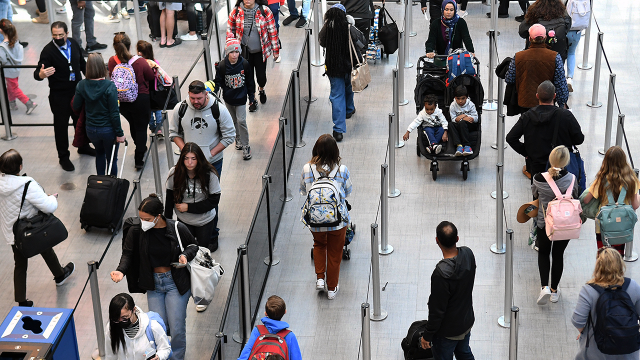
Do people who travel think differently about the world? A new Pew Research Center survey suggests they do.
Americans who have traveled internationally are more interested in and knowledgeable about foreign affairs, feel closer to others around the world, and favor a more active foreign policy, according to the survey of 3,576 U.S. adults conducted in spring 2023. We also surveyed people in 23 other countries about their international travel habits.
This analysis examines international travel with a focus on Americans’ travel, including which Americans travel abroad and how their interest in the world and views of international affairs differ from others.
For this analysis, we surveyed 3,576 U.S. adults from March 20 to March 26, 2023; 3,581 U.S. adults from March 21 to March 27, 2022; and 10,606 U.S. adults from June 14 to June 27, 2021. Everyone who took part in these surveys is a member of the Center’s American Trends Panel (ATP), an online survey panel that is recruited through national, random sampling of residential addresses. This way nearly all U.S. adults have a chance of selection. The survey is weighted to be representative of the U.S. adult population by gender, race, ethnicity, partisan affiliation, education and other categories. Read more about the ATP’s methodology .
For non-U.S. data, this report draws on nationally representative surveys of 27,285 adults conducted from Feb. 20 to May 22, 2023. All surveys were conducted over the phone with adults in Canada, France, Germany, Greece, Italy, Japan, the Netherlands, South Korea, Spain, Sweden and the United Kingdom. Surveys were conducted face-to-face in Hungary, Poland, India, Indonesia, Israel, Kenya, Nigeria, South Africa, Argentina, Brazil and Mexico. In Australia, we used a mixed-mode probability-based online panel.
Here are the June 2021 survey questions and responses used in this analysis. Those for the March 2022 survey may be found here , as well as those for the March 2023 survey .
How many Americans have traveled internationally?
Roughly three-quarters of Americans (76%) have visited at least one other country, including 26% who have been to five or more. About a quarter (23%) have not traveled internationally, though most in this group say they would if they had the opportunity.
Related: How experience with international travel varies across 24 countries
To analyze how Americans’ travel experiences relate to their attitudes on other questions, we placed people into three categories:
- Globe-trotters have traveled to at least five other countries. About a quarter of the U.S. public (26%) falls into this category.
- Casual travelers have traveled to between one and four other countries. Half of Americans fall into this category.
- Nontravelers have never left the United States. This category includes 23% of Americans.
Compared with Americans, people in many European nations are more likely to have traveled to five or more other countries. For instance, 88% of Swedes have done so.
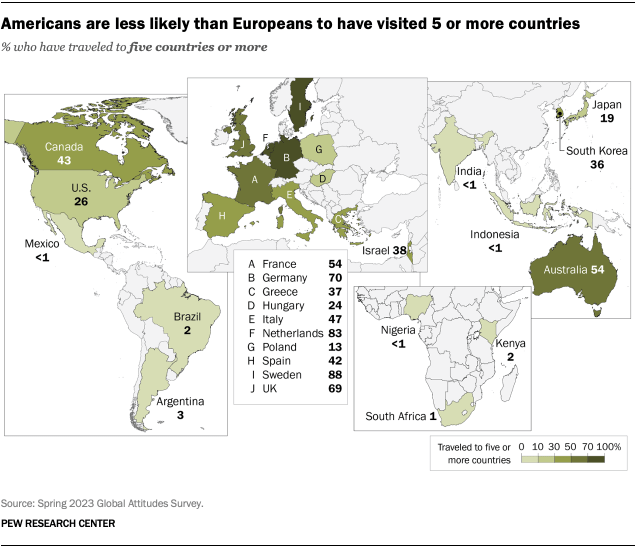
However, international travel is much less common in many middle-income nations. It is strongly correlated with a nation’s gross domestic product per capita. (For more on international travel and views about global engagement, read “Attitudes on an Interconnected World.” )
Who travels internationally?

Perhaps unsurprisingly, older people are more likely than younger people to have traveled internationally. Americans ages 65 and older are more than twice as likely as adults under 30 to fall into our globe-trotter category (37% vs. 17%).
Income is even more strongly related to travel than age. Two-thirds of upper-income Americans have traveled to at least five countries, compared with 9% of Americans with lower incomes.
Similarly, Americans with a postgraduate degree are far more likely to be globe-trotters than those with a high school education or less (59% vs. 10%).
Residents of suburban and urban areas generally have more international travel experience than people who live in rural areas.
There are no significant partisan differences when it comes to international travel: 26% of Democrats and Democratic-leaning independents qualify as globe-trotters, as do 28% of Republicans and GOP leaners.
Do travelers know more about the world?
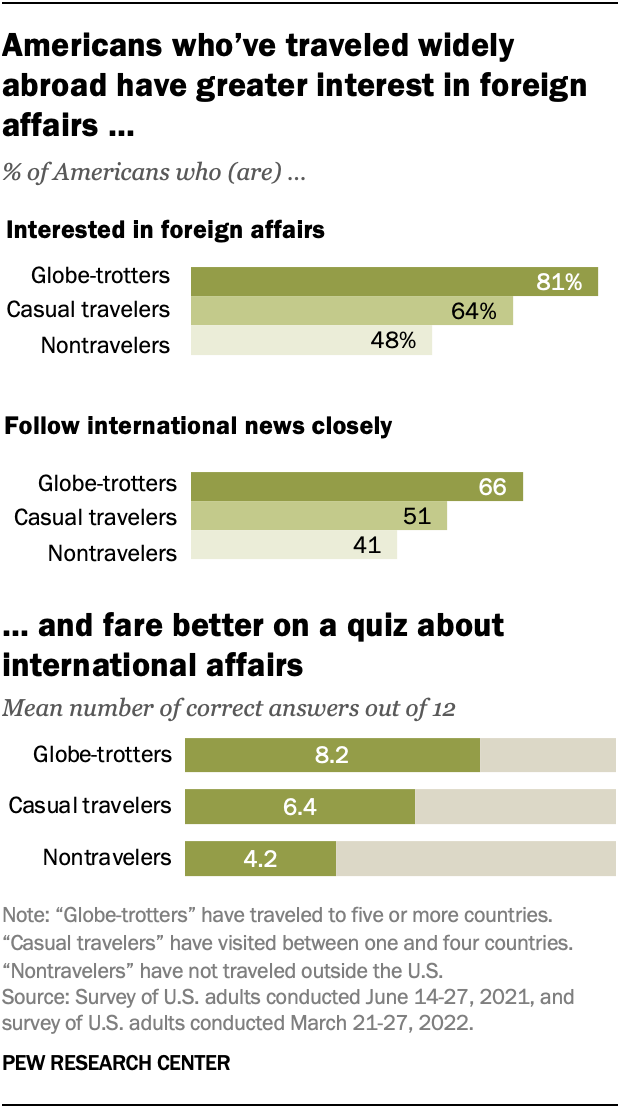
Globe-trotters are especially likely to say they are interested in foreign affairs and follow international news. Casual travelers, in turn, are more likely than nontravelers to do so.
Globe-trotters are also the most knowledgeable about international affairs. In 2022, we conducted an international affairs quiz , asking Americans 12 questions related to international news. On average, globe-trotters got 8.2 of the 12 questions correct, compared with 6.4 for casual travelers and 4.2 for nontravelers.
Is international travel related to views of global engagement?

International travel experience is also linked to Americans’ views about international affairs and their feelings of connection to other people around the world.
When asked which comes closest to their view, 57% of globe-trotters say the U.S. should be active in world affairs, while 43% say the U.S. should pay less attention to problems in other countries and concentrate on problems at home. In contrast, most casual travelers and nontravelers say the U.S. should focus on problems at home.
In all three groups, at least half of respondents say that when the U.S. is making foreign policy, it should take other countries’ interests into account – even if that means making compromises. But globe-trotters are especially likely to hold that view.
Globe-trotters are also particularly likely to say they feel close to people around the world, with 42% saying so. By comparison, 34% of casual travelers and 30% of nontravelers say this.
- International Affairs

Richard Wike is director of global attitudes research at Pew Research Center

Janell Fetterolf is a senior researcher focusing on global attitudes at Pew Research Center
A growing share of Americans have little or no confidence in Netanyahu
Fewer americans view the united nations favorably than in 2023, what are americans’ top foreign policy priorities, rising numbers of americans say jews and muslims face a lot of discrimination, younger americans stand out in their views of the israel-hamas war, most popular.
1615 L St. NW, Suite 800 Washington, DC 20036 USA (+1) 202-419-4300 | Main (+1) 202-857-8562 | Fax (+1) 202-419-4372 | Media Inquiries
Research Topics
- Age & Generations
- Coronavirus (COVID-19)
- Economy & Work
- Family & Relationships
- Gender & LGBTQ
- Immigration & Migration
- Internet & Technology
- Methodological Research
- News Habits & Media
- Non-U.S. Governments
- Other Topics
- Politics & Policy
- Race & Ethnicity
- Email Newsletters
ABOUT PEW RESEARCH CENTER Pew Research Center is a nonpartisan fact tank that informs the public about the issues, attitudes and trends shaping the world. It conducts public opinion polling, demographic research, media content analysis and other empirical social science research. Pew Research Center does not take policy positions. It is a subsidiary of The Pew Charitable Trusts .
Copyright 2024 Pew Research Center
Terms & Conditions
Privacy Policy
Cookie Settings
Reprints, Permissions & Use Policy
7 of the best all-inclusive experiences to book this year, from a travel planner
- As a travel planner, my clients seem to be increasingly interested in all-inclusive trips .
- Some of my favorite luxury resorts are in Costa Rica, the Maldives, and Isla Mujeres.
- Cruises, group tours, and adults-only lodgings can also come with all-inclusive options.

As a travel planner at Marvelous Mouse Travels , I know vacations are expensive — especially if you're looking to go somewhere this summer . But all-inclusive travel is often a great way to get the most value out of a luxury experience.
I've been on several all-inclusive vacations with my family, friends, and work, and I've helped other people book them in destinations around the world .
Here are some of the best all-inclusive experiences I'm recommending to my clients this year.
Try a split-stay vacation to see the best of Costa Rica.
Costa Rica is one of the most sought-after vacations , and for good reason. It's great for both relaxation and adventure.
I recommend booking a split stay, starting at an all-inclusive resort in Guanacaste near the beach for some fun in the sun and moving to a resort near the famous Arenal Volcano for a jungle adventure.
Some of my favorite resorts in Costa Rica are the Westin Reserva Conchal and the Dreams Las Mareas. And if you're looking for an even more unique experience, check out the glorious swim-out suites with private pools at Dreams.
Baglioni Maldives is one of my favorite all-inclusive resorts.
The Maldives, a remote set of islands in the Indian Ocean, offers a plethora of resort options for couples and families, but Baglioni Maldives is my favorite.
For many in the US, getting to the islands can be daunting — there are very few direct commercial flights, and it can take almost an entire day. But it's hard to beat the country's luxury accommodations and gorgeous landscape.
The Maldives also has some of the most beautiful marine life and coveted spots for snorkeling and scuba diving.
No matter where you go, overwater bungalows are the ultimate all-inclusive splurge.
Overwater bungalows — villas standing on poles over open ocean water — are prevalent at all-inclusive resorts in destinations like the Maldives, Fiji, and Bali.
But I've also come across the luxurious accommodations at select adults-only Sandals Resorts throughout the Caribbean.
I think having a private villa on the water is the perfect way to unwind and relax.
Adults-only vacations are on the rise.
Traveling with kids can be a blast, but I also think it's important for adults to take a much-needed break on their own.
Adults-only resorts have been a total respite for me and my husband after hectic months of juggling work with our kids' school and sports schedules.
If you're looking to unwind with a partner, relax on a girls' trip, or even connect with your adult children, there are countless adults-only, all-inclusive resorts to choose from, depending on where you're looking to visit.
Some properties, including Sandals and Beaches Resorts, also offer butler service. Designated staff members can help with anything from room requests and dining reservations to cabana rentals and transportation coordination.
I upgraded to the service at my favorite adults-only spot, Le Blanc Los Cabos, and I felt totally pampered.
Isla Mujeres is pure luxury.
Isla Mujeres, a small island off the coast of Cancún, is known for its crystal-clear, turquoise water and peaceful vibe. It's also home to Playa Norte, one of the best beaches in Mexico .
Impressions Isla Mujeres by Secrets is a gorgeous all-inclusive resort on the island. It offers luxury at its finest, but with only 125 rooms, it has a boutique feel.
One of my favorite features of the resort is the waterslide that leads right into the beautiful ocean.
There are plenty of all-inclusive packages at sea.
Cruising is one of the most popular vacations , whether it's an epic adventure on a Royal Caribbean Cruise, a couples-only journey on Virgin Voyages, or a regal tour of Europe on Viking River Cruises.
Although cruises aren't traditionally considered all-inclusive, with the right booking, they can have the same feel as a luxury resort.
Most cruise bookings include food, nonalcoholic drinks, and live entertainment. If you add beverage packages and excursions in advance, your trip should be fully paid for before you depart.
Book a small-group or private tour if you're looking for adventure.
Group travel is a great way to explore new places while soaking up culture and history.
Popular destinations include Italy, Japan, Costa Rica, and Alaska, and many travel companies take care of everything for you, essentially making it all-inclusive.
I like Adventures by Disney , which offers small-group travel all over the world facilitated by seasoned guides. All the trip details are taken care of, including experiences, food, lodging, and transportation.
Additionally, Kensington Tours offers luxury private travel where every facet of the trip is meticulously planned for you.
- Main content
Travel could be a good deal this summer. Here's when plane ticket prices will peak.
Spring is springing, and according to Hopper, it’s time to start thinking about your summer vacation plans.
New data from the online booking site shows some favorable trends for travelers in the next few months, including slightly lower airfares compared with 2023 and hotel and car rental prices that are more or less flat year-over-year.
Here’s what you need to know as you prepare to book, whether you’re looking for a domestic getaway or go on an overseas adventure. It’s also not too late to take advantage of deals on some last-minute trips.
How much are spring and summer plane tickets?
According to Hopper, the best deals right now are on domestic airline tickets. Round-trip flights within the U.S. are averaging $290 in April, but prices are expected to rise in the months ahead.
Hopper’s data shows prices for domestic flights will peak between May and June at $315 on average, then will gradually fall through the summer, reaching a low of $264 on average in September.
On a call with investors discussing first-quarter earnings Wednesday, Delta Air Lines CEO Ed Bastian said summer travel demand has been pushed forward in recent years in part because schools, especially in the South, are finishing their summer breaks earlier in the year.
Is airport Wi-Fi safe to use? How to keep your information safe while traveling.
Short vs. long cruises: Which one is right for you? Here's how they compare.
This summer also will be a good time to travel internationally; Hopper data shows fares to most destinations abroad are down compared with last year.
“Airfare to international destinations continues to improve following two years of bloated prices due to quickly recovering demand, high fuel prices and supply constraints. Airfare to most major regions of the world has dropped compared to last year with the exception of trips to Canada,” Hayley Berg, Hopper’s chief economist, said in the report. “International fares remain higher than pre-pandemic levels to most regions, as higher fuel prices persist and airlines continue to rebuild capacity to many regions.”
How much will a hotel room for the spring and summer cost?
Hotel prices remain mostly flat compared with the same time last year. Rooms in the U.S. are averaging $206 a night; better deals are available in some trending international destinations like Osaka, Japan, and Istanbul, Turkey.
According to Hopper, Las Vegas, New York and Chicago remain popular destinations in the U.S.
Will car rental prices rise this summer?
Car rental prices also haven’t increased much since last year and average $42 a day, according to Hopper.
The report shows most travelers rent a car for about four days, and warm-weather destinations like Orlando and Los Angeles remain popular pickup points.
Zach Wichter is a travel reporter for USA TODAY based in New York. You can reach him at [email protected].
- Search Please fill out this field.
- Manage Your Subscription
- Give a Gift Subscription
- Sweepstakes
This Ski Resort Town Was Just Named the Most Expensive Vacation Destination in the U.S.
You may want to start saving up for that vacation right now.
:max_bytes(150000):strip_icc():format(webp)/Stacey-Leasca-2000-631fabdcfe624115bea0ce8e25fdec96.jpg)
janelca/Getty Images
The average cost of a one-week vacation in the U.S. for just one person hit nearly $2,000 in 2023, up by more than $400 over the previous year, according to a study by Bankrate . And this is just for a basic trip. But if you're hoping to go to places like New York City , you're going to spend a pretty penny, as it was just named the eighth most expensive destination in America.
The travel experts at OptimosTravel recently analyzed more than 100 vacation spots in the United States, assessing each on the price of a daily meal, public transit, accommodation rates, and attraction fees, all in an effort to uncover the 10 most expensive vacation destinations in the nation. After crunching the numbers, it found that Aspen, Colorado, is the most expensive of all.
"Aspen, Colorado, tops the list as the most expensive vacation spot, with a total daily cost of $761.39 per person, leading to a whopping $5,329.72 for a 7-day trip per person," the team noted in its findings, which it shared with Travel + Leisure.
The research crew noted that gourmet meals can cost upward of $100.5 per day, while "opulent accommodations" cost $494.56 per night. "Aspen's breathtaking scenery comes with a premium price tag," it added, "and for a family of four, the skies are the limit at $13,691. Even with modest transportation costs at $7, the city's unmatched offerings ensure its status as the epitome of luxury travel."
Joining Aspen at the top of the most expensive list is Park City, Utah, in second, where travelers can expect to pay $93.75 for daily meals and $471 per night for lodging. "A week's stay costs $4,971 for one and $12,632 for a family of four," the team shared.
Maui, Hawaii, wasn't far behind in third, with a daily cost of $682. "It boasts the highest meals ($112.50) and lodging ($534.11) among top destinations, but affordable attractions ($26.63) balance the cost. A week costs $4,762 solo or $10,782 for families."
These spots were followed by Montauk, New York, in fourth, with a daily cost of $613.77; Santa Monica, California, in fifth with a daily cost of $592.05; Key West, Florida in sixth, with a daily cost of $537; Charleston in seventh with a daily cost of $535.68; and New York City in eighth with a daily cost of $511.34.
Rounding out the top 10 is Martha's Vineyard, Massachusetts in ninth with a daily cost of $496.65, and one more ski town, Jackson Hole, Wyoming, in 10th, with a daily cost of $490 per day. And while, yes, this all sounds expensive, you can't really put a price tag on making new memories. Right? See the full findings at optimostravel.com .
Screen Rant
Disneyland vs disney world: all differences & which to visit.
Disneyland and Disney World are both great vacation spots, but each resort caters to different types of travelers and trips. Which should you choose?
- Disneyland has two theme parks, while Disney World has four. The latter requires a longer stay to see everything.
- Disneyland is walkable, but Disney World requires visitors to travel via car, monorail, boat, and bus.
- Disneyland is typically slightly cheaper than Disney World, making it a good option for shorter trips or budget-conscious travelers.
There are six Disneyland parks worldwide, and two of them reside in the United States — but while Disneyland California and Walt Disney World Resort have notable similarities, they also have some major differences . Disney's California-based location is the first of its theme parks to open worldwide, but Walt Disney World has caught up in terms of popularity. This might be because the Florida resort is larger than the California one, allowing it to offer more accommodations and attractions.
This doesn't necessarily mean Walt Disney World is better than Disneyland; both locations are worth checking out, and each will appeal to different types of travelers. Whether someone chooses Walt Disney World or Disneyland will largely depend on what they're looking for from their vacation. It's worth learning what makes each resort unique before purchasing tickets to Disneyland or its Florida-based counterpart.
All Disney Castles At Every Disneyland Park
Disneyland has 2 parks & disney world has 4 parks (plus 2 water parks), disney world is larger & better for a longer getaway.
Probably the biggest difference between Disneyland California and Walt Disney World is the size of each resort , as the latter is much larger than its California-based counterpart. According to Travel + Leisure , Disneyland clocks in at around 500 acres, while Walt Disney World Resort is around 25,000 acres. That's a massive difference, and it shows in the number of parks at each location. Disneyland only has two theme parks: Disneyland Park and Disney California Adventure Park . Meanwhile, Walt Disney World has four theme parks on its premises: Magic Kingdom, Epcot, Hollywood Studios, and Animal Kingdom.
This distinction can be helpful when planning a trip to Disney, as visitors will want to choose the location that better suits the amount of time they plan to spend there.
With four parks to cover, Disney World could be the better choice for a longer getaway . The parks at Disneyland California are easy enough to cover in a day or two. However, it's impossible to see all of Disney World in that time. This distinction can be helpful when planning a trip to Disney, as visitors will want to choose the location that better suits the amount of time they plan to spend there. Walt Disney World Resort also features two water parks — Typhoon Lagoon and Blizzard Beach — which require additional time to visit. They are great for summer trips, though.
Disneyland Is Walkable, But Walt Disney World Isn't
Walt disney world requires more travel planning.
The size difference between Disneyland and Disney World is important to note, as the latter resort also requires more travel planning. Disneyland Park and Disney California Adventure Park are right next to one another, and they aren't far from the Downtown Disney District and Disney's Anaheim-based hotels. This means that Disneyland is a largely walkable trip , though children, elderly visitors, and people with disabilities may require additional accommodation. While walking all over Disneyland will take time and energy, it's often doable — and that's not the case for Walt Disney World .
The separate parks at Walt Disney World Resort are much further from one another, so visitors will need to plan their travels accordingly. Bringing or renting a car can be a smart choice when visiting Disney World. Of course, the resort also has buses, boats, and monorails that carry guests from one place to another. This takes extra time and must be added to any Disney World itinerary.
Disney World Has More Than 20 Disney Hotels Neary (& Disneyland Only Has 3)
The florida resort offers a wider range of options.
Disney World's larger size also allows the Florida resort to have more official Disney hotels than Disneyland California. Disneyland California has three Disney hotels nearby: the Disneyland Hotel, the Pixar Place Hotel, and the Grand Californian Hotel & Spa. These are all within walking distance of the parks, but they do limit one's choices when it comes to finding connected hotels. With Disney often offering perks through its accommodations, it's always good to find a hotel that falls under its umbrella.
Disney World has more than 20 hotels near its theme parks — and while they aren't necessarily within walking distance, they offer a wider range of themes and price points for visitors to choose from. Hotels like Disney's All-Star Movies Resort and Disney's Art of Animation Resort allow visitors to stay in a connected hotel at a lower price point. Meanwhile, lodgings like the Grand Floridian Hotel & Resort and Disney's Riviera Resort offer the opportunity for a more luxurious, pricier stay.
Disneyland Is Slightly Cheaper Than Disney World
Ticket prices are slightly cheaper & disney world warrants a longer stay.
Disneyland and Disney World are both fairly expensive to visit, but the Florida resort will typically cost visitors more money . Ticket prices for both parks vary depending on the time of year and demand, but as of this writing, a standard one-day ticket to Disneyland starts at about $134 per adult. The equivalent ticket starts at around $149 for Disney World (via Disneyland.com / DisneyWorld.com ). This may not seem like a huge difference, but depending on how many people are visiting and how many days they're staying, it can add up.
There's also the fact that Disney World offers more for guests to see, meaning they'll have to stay longer. While visitors can purchase a one-day park hopper ticket or a two-day ticket for Disneyland, they'll likely need to purchase more days if they want to see all the parks at Walt Disney World . This can make Disneyland better for those on a budget, if only slightly.
Should You Visit Disneyland California Or Walt Disney World Resort?
The resort visitors choose depends on their vacation preferences.
The decision to visit Disneyland California or Walt Disney World comes down to each traveler's preferences , as both parks cater to different types of vacations and guests. Those hoping to travel for a shorter period of time or maintain a budget may prefer Disneyland. It offers many of the same experiences and attractions, but it's possible to cover the parks in a couple of days. It can also save travelers some money, even if it's still on the pricier side of vacations overall. It's certainly better for shorter trips than Disney World, which is impossible to cover over a long weekend.
Travelers looking for longer getaways with more variety may be better off at Walt Disney World , as there are numerous parks and hotels to fill up a long trip. The options alone are much greater at Disney World, and there's more to see over a lengthier period of time. Of course, Disney World also requires more planning and traveling, so anyone looking to avoid the more tedious aspects of vacationing may prefer Disneyland . Diehard Marvel fans may also prefer the California parks, as they contain Avengers Campus.
Source: Travel + Leisure , Disneyland.com

IMAGES
COMMENTS
Defining "Travel" versus "Vacation". In talking with international travelers Jared & Courtney, they identified several clear distinctions between travel and vacation. They described that vacation is "about getting somewhere and then relaxing". It is dedicated time to unwind in a specific location. Picture going to an all-inclusive ...
In this article, I'll talk about the big differences between taking a vacation and traveling and why I think that distinction is so important. Vacations: All about the escape and R&R. Vacations are largely about an escape from the daily grind. Hammocks, white sandy beaches, and poolside cabanas come to mind.
No country is a "vacation spot" or "travel spot.". You can vacation or travel in any country, and in any city. For example, a vacation in Mexico would be staying at an all-inclusive resort in Cancun. Travel in Mexico would be staying in Mexico City and exploring the streets, meeting locals, and probably getting lost.
Key Differences Between Travel and Vacation. Understanding the nuances between vacation and travel is essential for anyone yearning to embark on a memorable journey. While the two terms might seem similar at first glance, a deeper dive reveals significant contrasts that can shape the nature of your escapade.
Travel and vacation are both great things. But, there is a big difference between traveling and going on vacation. Travel vs Vacation. According to Wikipedia, a vacation, or holiday, is a leave of absence from a regular occupation, or a specific trip, usually for the purpose of recreation or tourism.. Travel, to me, is more about discovering different cultures and expanding your horizon.
By understanding the differences between travel and vacation, you can tailor your experiences to suit your individual desires and make the most of every journey. In conclusion, while travel and vacation may have distinct meanings and purposes, both offer valuable opportunities for growth, enjoyment, and enrichment.
Travel is an adventure that stretches you. You end up growing new skills, such as figuring out a mass transit system on the fly, or how to ask where the nearest bus stop is without knowing the language. The experience may be hard, but it is entirely worth it. Travel opens your eyes to the world in a way that vacation simply cannot.
The Key Differences. While both travel and vacation offer the chance to escape reality, their purposes and outcomes differ significantly. Here are the key distinctions between the two: 1. Mindset: When you embark on a travel adventure, you adopt a curious and open mindset. You willingly embrace the challenges and uncertainties that come with ...
The difference in trip lengths between travel and a vacation. Another difference between travel and vacation is the length of the trip. Vacations are generally 1-4 weeks in length with most being 2 weeks or less. Our trips are generally 8-10 weeks. We like to spend a week or two in each place.
A vacation is just that: a break. During a vacation, many people will get a resort hotel room, and center their trip around relaxing. Or, some people will take to adventure sports, exploring, cooking classes, museums, etc, but the thing is, it's still their way to unwind and relax after a year of working hard. Ba Kao Lam, Thailand.
Travel is about more than just relaxing. Having some time to just relax is never a bad thing. A traditional vacation can mean settling in somewhere comfortable and staying put. It can bring rejuvenation, mend aches and pains and give you a break from the chores and monotony of daily life.
People ask me all the time why I love traveling so much. The reason is that I love exploring new places and learning about the cultures of the places I'm visiting. But, traveling is not a vacation. There is a HUGE difference between the two! In fact, sometimes I feel like I need a vacation after all of my travels!
Vacations are different from trips because vacations are about the experience. My vacations focus primarily on self-care and wellness. My main concern on a vacation is to relax, recover from the day-to-day grind and be merry. On a vacation, I have no agenda and generally, I haven't put a lot of thought into planning things to do.
Difference between Vacation and Travel. I recently read an excellent online article from The Atlantic about the dire financial straits that over 50% of all Americans find themselves in and something in the article struck me. The writer mentioned that because of the various financial choices he had made regarding his and his family's finances ...
As verbs the difference between travel and vacation is that travel is to be on a journey, often for pleasure or business and with luggage; to go from one place to another while vacation is to spend or take a vacation. As nouns the difference between travel and vacation is that travel is the act of traveling while vacation is freedom from some ...
A trip is something that we go on with expectations of having a purpose each day to see something new or be adventurous.. A vacation is all about rejuvenation. Most often, people go on vacations to relax and recover from the stress of their daily lives back home. The goal of vacations is to come home feeling refreshed and renewed.
Your Wanderlust Is Inauthentic: The Real Difference Between Travel And Vacation. by Alessandra S. June 16, 2014. Stocksy. There's a new trend of wanting to boast about one's travels and ...
Definition and Differences between Travel, Trip, and Journey. Travel is a verb that means going to a place, especially far away, while trip refers to the process of traveling from one place to another, usually for a short time. ... I traveled to Europe for my summer vacation. It was an exciting travel experience filled with new cultures ...
While trips and vacations both involve traveling to new places, there are some key differences between them. One of the main differences is that vacations tend to be longer and more leisurely than trips. When you go on vacation, you're often looking to escape your daily routine and relax in a new environment.
Vacation refers to leisure travel in English-speaking North America, such as a brief pleasure vacation or a trip overseas. In Commonwealth nations, the phrase "holiday" is used to refer to both a leave of absence from work and a vacation or excursion. Staying at home or travelling anywhere might be considered a vacation.
Travel - to go from one place to another. Trip - a journey that is often for a short period of time. NOTE: There are some exceptions to the general rule above. Travel can also be a noun when it refers to the act of traveling. Travel is difficult in that part of the country since there are no paved roads. Travel broadens your mind.
7. Travel can be local, national, or international. Someone might travel to the next town for work or cross a continent for a family visit. It does not necessarily imply leisure or recreation. Tourism, however, has a recreational connotation. It's about experiencing new cultures, attractions, and activities, often in locations that are ...
Extended vacations, ranging from a couple of weeks to several months, are typically undertaken by travelers with the desire to fully immerse themselves in a new environment. These vacations often involve international travel, exploring different regions or countries, and experiencing various cultures.
Residents of suburban and urban areas generally have more international travel experience than people who live in rural areas. There are no significant partisan differences when it comes to international travel: 26% of Democrats and Democratic-leaning independents qualify as globe-trotters, as do 28% of Republicans and GOP leaners.
For the vacation when you need an exotic adventure, head toward Fiji and stay at the Como Laucala Island resort. As a private location, there are just 25 standalone villas available.
As a travel planner at Marvelous Mouse Travels, I know vacations are expensive — especially if you're looking to go somewhere this summer. But all-inclusive travel is often a great way to get ...
Here's the good news: the vacation can become a reality for much less than you think. DIVEIN Travel released its latest study showcasing the top beach destinations for budget-conscious travelers.
Hopper's data shows prices for domestic flights will peak between May and June at $315 on average, then will gradually fall through the summer, reaching a low of $264 on average in September.
The travel experts at OptimosTravel recently analyzed more than 100 vacation spots in the United States, assessing each on the price of a daily meal, public transit, accommodation rates, and ...
Probably the biggest difference between Disneyland California and Walt Disney World is the size of each resort, as the latter is much larger than its California-based counterpart.According to Travel + Leisure, Disneyland clocks in at around 500 acres, while Walt Disney World Resort is around 25,000 acres.That's a massive difference, and it shows in the number of parks at each location.